Global Business Environment: Impact on Organizational Culture, Function and Structure
VerifiedAdded on 2023/06/11
|23
|6091
|493
AI Summary
This report examines the impact of global business environment on organizational culture, function and structure using SASOL as an example. It covers PESTLE analysis, driving factors, impact of digital technology, structure, culture and governance using McKinsey model, Hofstede's dimension of culture, ethical and sustainable factors, strategic decision-making in relation to risk and diversification, and range of strategic global expansion routes available to the organization.
Contribute Materials
Your contribution can guide someone’s learning journey. Share your
documents today.
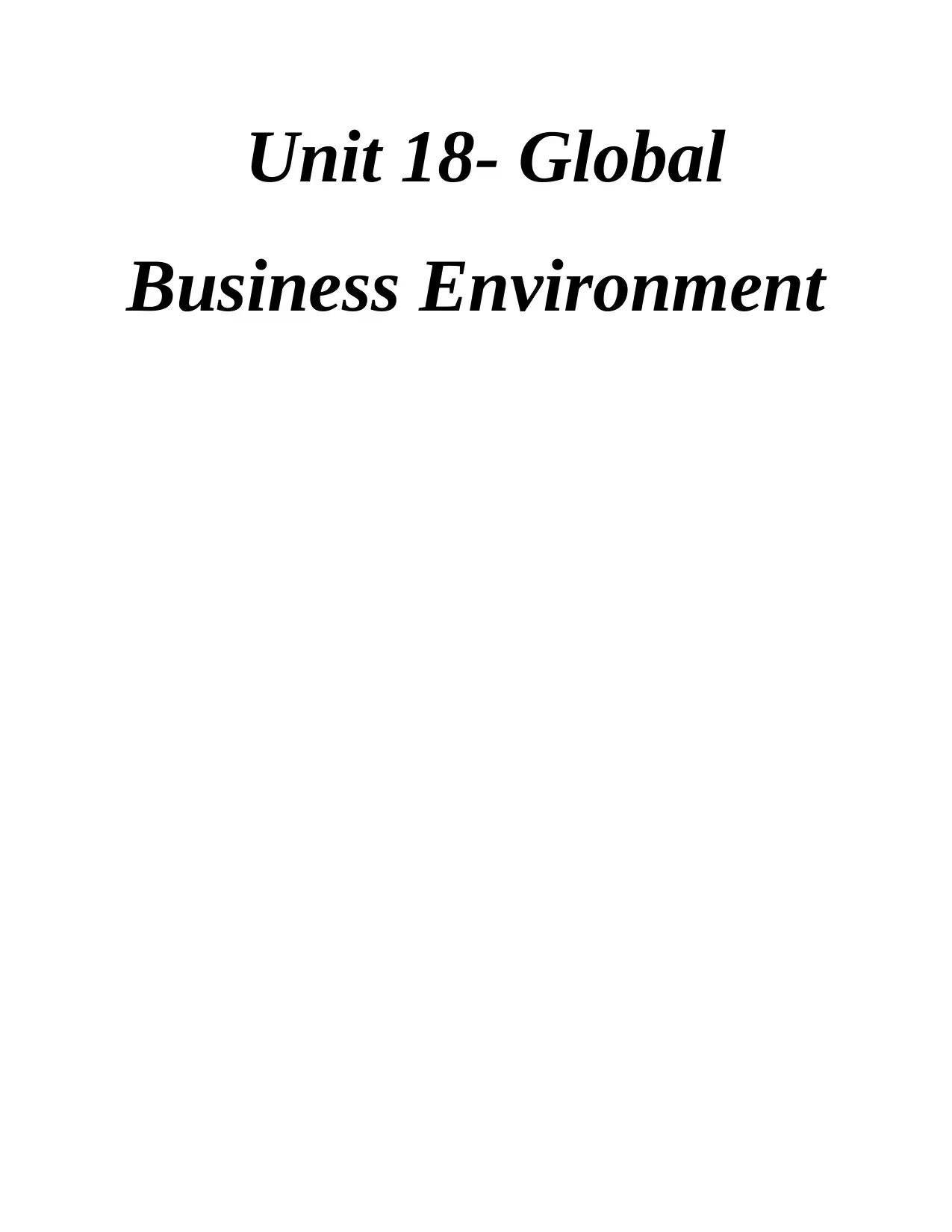
Unit 18- Global
Business Environment
Business Environment
Secure Best Marks with AI Grader
Need help grading? Try our AI Grader for instant feedback on your assignments.
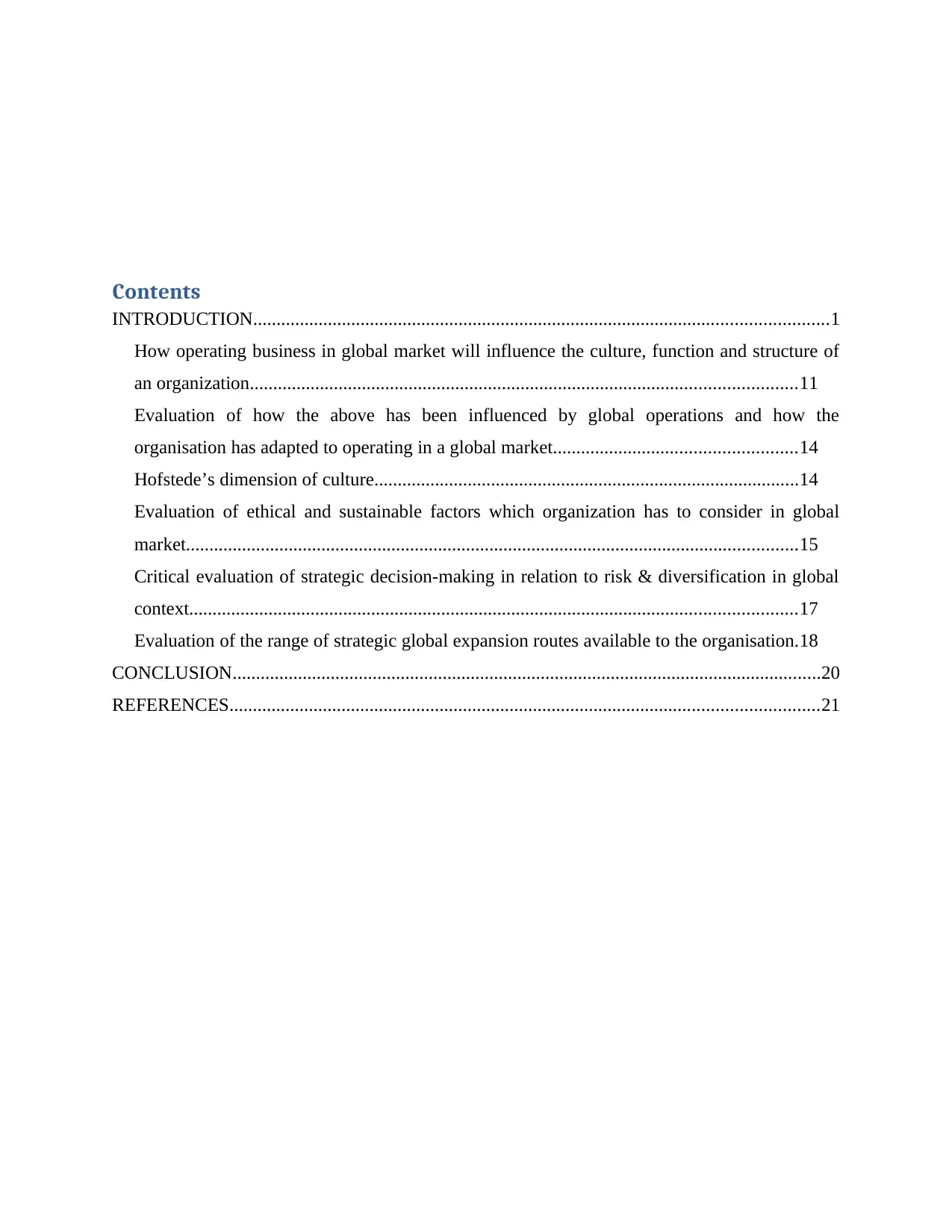
Contents
INTRODUCTION...........................................................................................................................1
How operating business in global market will influence the culture, function and structure of
an organization.....................................................................................................................11
Evaluation of how the above has been influenced by global operations and how the
organisation has adapted to operating in a global market....................................................14
Hofstede’s dimension of culture...........................................................................................14
Evaluation of ethical and sustainable factors which organization has to consider in global
market...................................................................................................................................15
Critical evaluation of strategic decision-making in relation to risk & diversification in global
context..................................................................................................................................17
Evaluation of the range of strategic global expansion routes available to the organisation.18
CONCLUSION..............................................................................................................................20
REFERENCES..............................................................................................................................21
INTRODUCTION...........................................................................................................................1
How operating business in global market will influence the culture, function and structure of
an organization.....................................................................................................................11
Evaluation of how the above has been influenced by global operations and how the
organisation has adapted to operating in a global market....................................................14
Hofstede’s dimension of culture...........................................................................................14
Evaluation of ethical and sustainable factors which organization has to consider in global
market...................................................................................................................................15
Critical evaluation of strategic decision-making in relation to risk & diversification in global
context..................................................................................................................................17
Evaluation of the range of strategic global expansion routes available to the organisation.18
CONCLUSION..............................................................................................................................20
REFERENCES..............................................................................................................................21
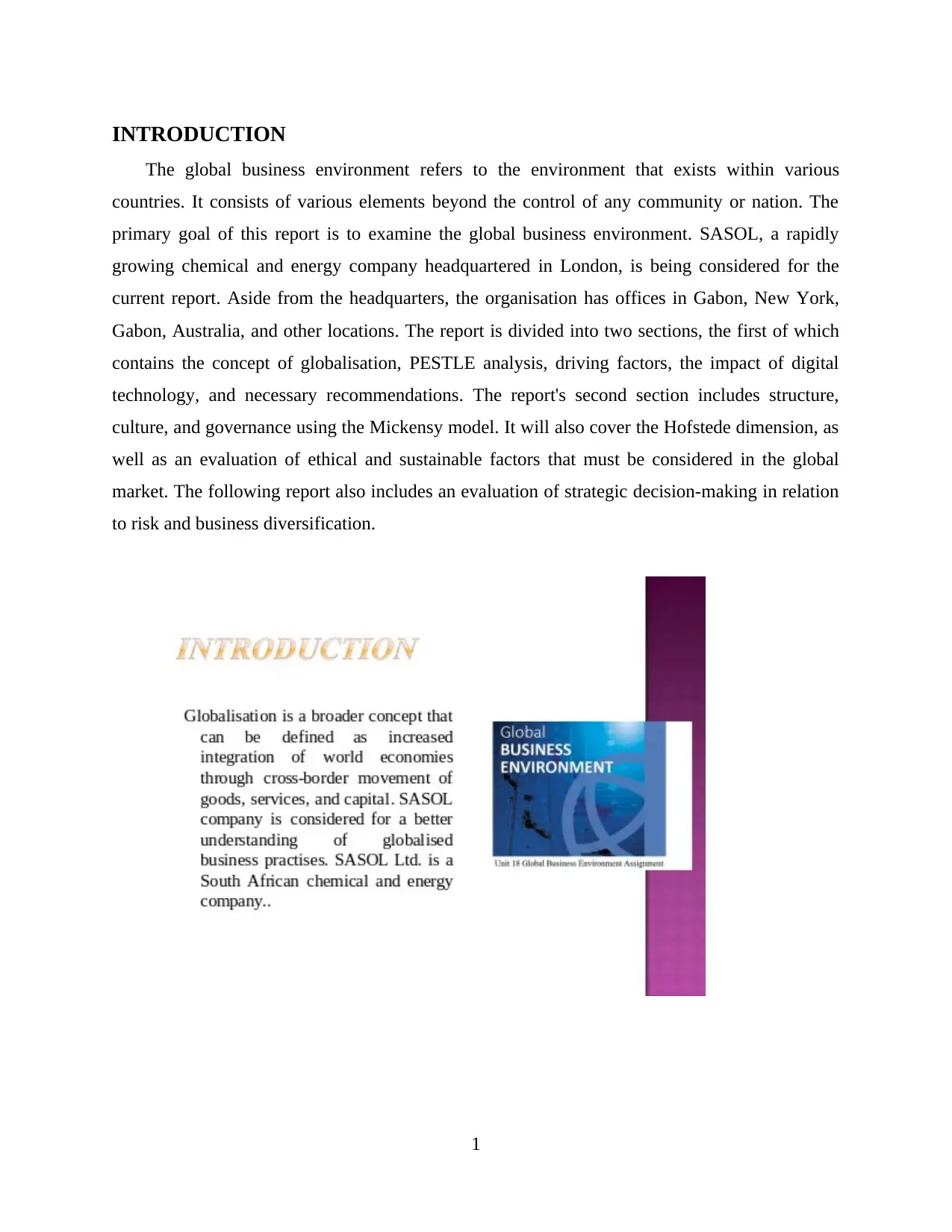
INTRODUCTION
The global business environment refers to the environment that exists within various
countries. It consists of various elements beyond the control of any community or nation. The
primary goal of this report is to examine the global business environment. SASOL, a rapidly
growing chemical and energy company headquartered in London, is being considered for the
current report. Aside from the headquarters, the organisation has offices in Gabon, New York,
Gabon, Australia, and other locations. The report is divided into two sections, the first of which
contains the concept of globalisation, PESTLE analysis, driving factors, the impact of digital
technology, and necessary recommendations. The report's second section includes structure,
culture, and governance using the Mickensy model. It will also cover the Hofstede dimension, as
well as an evaluation of ethical and sustainable factors that must be considered in the global
market. The following report also includes an evaluation of strategic decision-making in relation
to risk and business diversification.
1
The global business environment refers to the environment that exists within various
countries. It consists of various elements beyond the control of any community or nation. The
primary goal of this report is to examine the global business environment. SASOL, a rapidly
growing chemical and energy company headquartered in London, is being considered for the
current report. Aside from the headquarters, the organisation has offices in Gabon, New York,
Gabon, Australia, and other locations. The report is divided into two sections, the first of which
contains the concept of globalisation, PESTLE analysis, driving factors, the impact of digital
technology, and necessary recommendations. The report's second section includes structure,
culture, and governance using the Mickensy model. It will also cover the Hofstede dimension, as
well as an evaluation of ethical and sustainable factors that must be considered in the global
market. The following report also includes an evaluation of strategic decision-making in relation
to risk and business diversification.
1
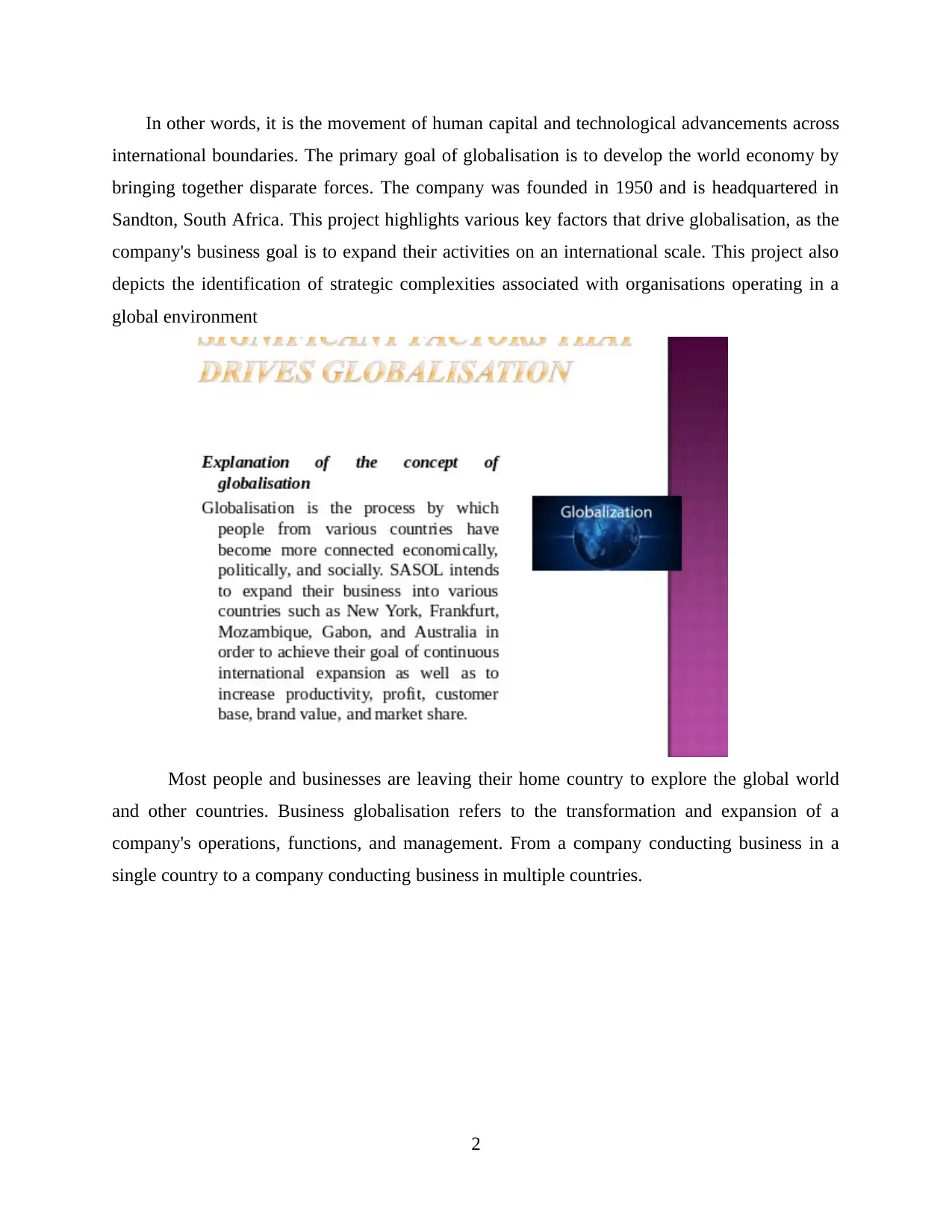
In other words, it is the movement of human capital and technological advancements across
international boundaries. The primary goal of globalisation is to develop the world economy by
bringing together disparate forces. The company was founded in 1950 and is headquartered in
Sandton, South Africa. This project highlights various key factors that drive globalisation, as the
company's business goal is to expand their activities on an international scale. This project also
depicts the identification of strategic complexities associated with organisations operating in a
global environment
Most people and businesses are leaving their home country to explore the global world
and other countries. Business globalisation refers to the transformation and expansion of a
company's operations, functions, and management. From a company conducting business in a
single country to a company conducting business in multiple countries.
2
international boundaries. The primary goal of globalisation is to develop the world economy by
bringing together disparate forces. The company was founded in 1950 and is headquartered in
Sandton, South Africa. This project highlights various key factors that drive globalisation, as the
company's business goal is to expand their activities on an international scale. This project also
depicts the identification of strategic complexities associated with organisations operating in a
global environment
Most people and businesses are leaving their home country to explore the global world
and other countries. Business globalisation refers to the transformation and expansion of a
company's operations, functions, and management. From a company conducting business in a
single country to a company conducting business in multiple countries.
2
Secure Best Marks with AI Grader
Need help grading? Try our AI Grader for instant feedback on your assignments.
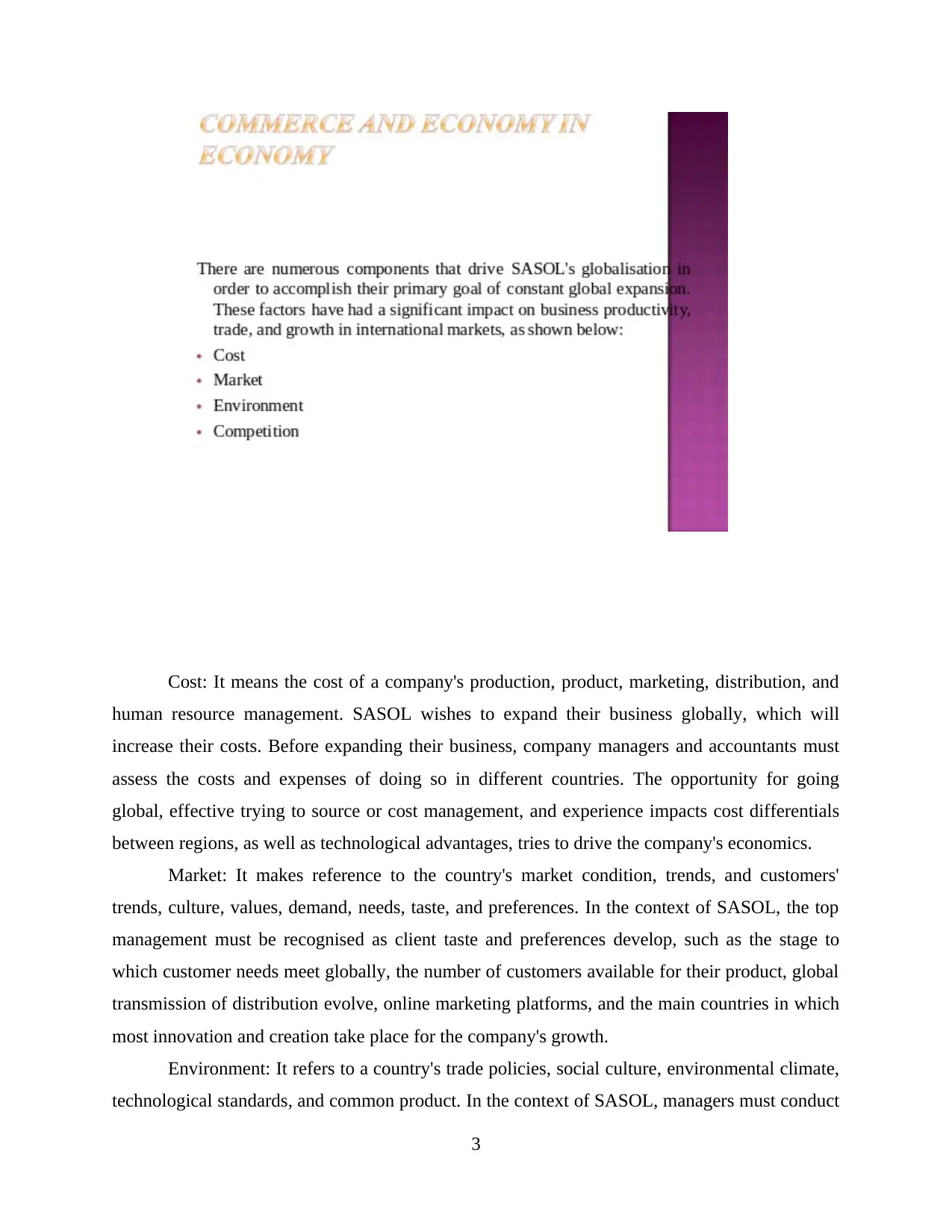
Cost: It means the cost of a company's production, product, marketing, distribution, and
human resource management. SASOL wishes to expand their business globally, which will
increase their costs. Before expanding their business, company managers and accountants must
assess the costs and expenses of doing so in different countries. The opportunity for going
global, effective trying to source or cost management, and experience impacts cost differentials
between regions, as well as technological advantages, tries to drive the company's economics.
Market: It makes reference to the country's market condition, trends, and customers'
trends, culture, values, demand, needs, taste, and preferences. In the context of SASOL, the top
management must be recognised as client taste and preferences develop, such as the stage to
which customer needs meet globally, the number of customers available for their product, global
transmission of distribution evolve, online marketing platforms, and the main countries in which
most innovation and creation take place for the company's growth.
Environment: It refers to a country's trade policies, social culture, environmental climate,
technological standards, and common product. In the context of SASOL, managers must conduct
3
human resource management. SASOL wishes to expand their business globally, which will
increase their costs. Before expanding their business, company managers and accountants must
assess the costs and expenses of doing so in different countries. The opportunity for going
global, effective trying to source or cost management, and experience impacts cost differentials
between regions, as well as technological advantages, tries to drive the company's economics.
Market: It makes reference to the country's market condition, trends, and customers'
trends, culture, values, demand, needs, taste, and preferences. In the context of SASOL, the top
management must be recognised as client taste and preferences develop, such as the stage to
which customer needs meet globally, the number of customers available for their product, global
transmission of distribution evolve, online marketing platforms, and the main countries in which
most innovation and creation take place for the company's growth.
Environment: It refers to a country's trade policies, social culture, environmental climate,
technological standards, and common product. In the context of SASOL, managers must conduct
3
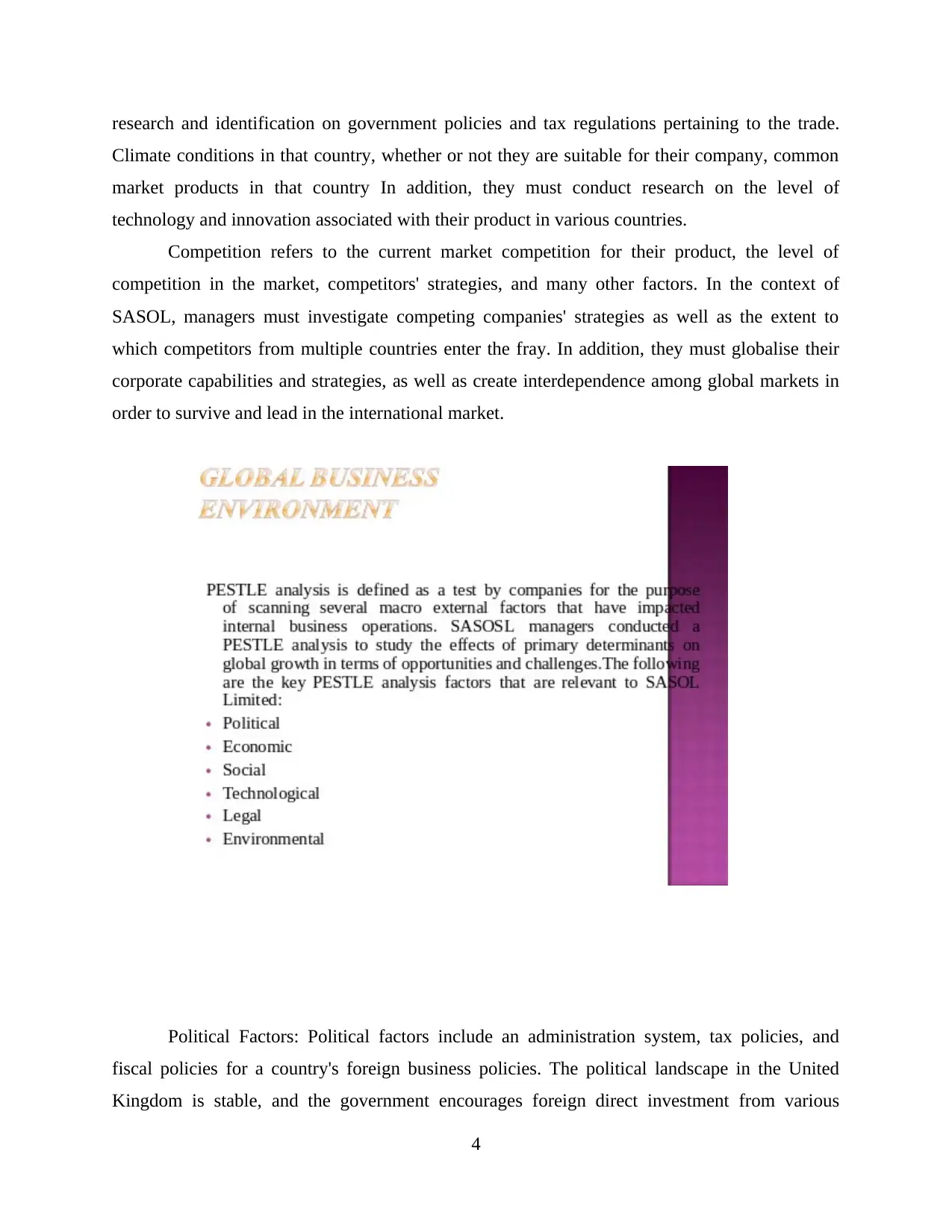
research and identification on government policies and tax regulations pertaining to the trade.
Climate conditions in that country, whether or not they are suitable for their company, common
market products in that country In addition, they must conduct research on the level of
technology and innovation associated with their product in various countries.
Competition refers to the current market competition for their product, the level of
competition in the market, competitors' strategies, and many other factors. In the context of
SASOL, managers must investigate competing companies' strategies as well as the extent to
which competitors from multiple countries enter the fray. In addition, they must globalise their
corporate capabilities and strategies, as well as create interdependence among global markets in
order to survive and lead in the international market.
Political Factors: Political factors include an administration system, tax policies, and
fiscal policies for a country's foreign business policies. The political landscape in the United
Kingdom is stable, and the government encourages foreign direct investment from various
4
Climate conditions in that country, whether or not they are suitable for their company, common
market products in that country In addition, they must conduct research on the level of
technology and innovation associated with their product in various countries.
Competition refers to the current market competition for their product, the level of
competition in the market, competitors' strategies, and many other factors. In the context of
SASOL, managers must investigate competing companies' strategies as well as the extent to
which competitors from multiple countries enter the fray. In addition, they must globalise their
corporate capabilities and strategies, as well as create interdependence among global markets in
order to survive and lead in the international market.
Political Factors: Political factors include an administration system, tax policies, and
fiscal policies for a country's foreign business policies. The political landscape in the United
Kingdom is stable, and the government encourages foreign direct investment from various
4
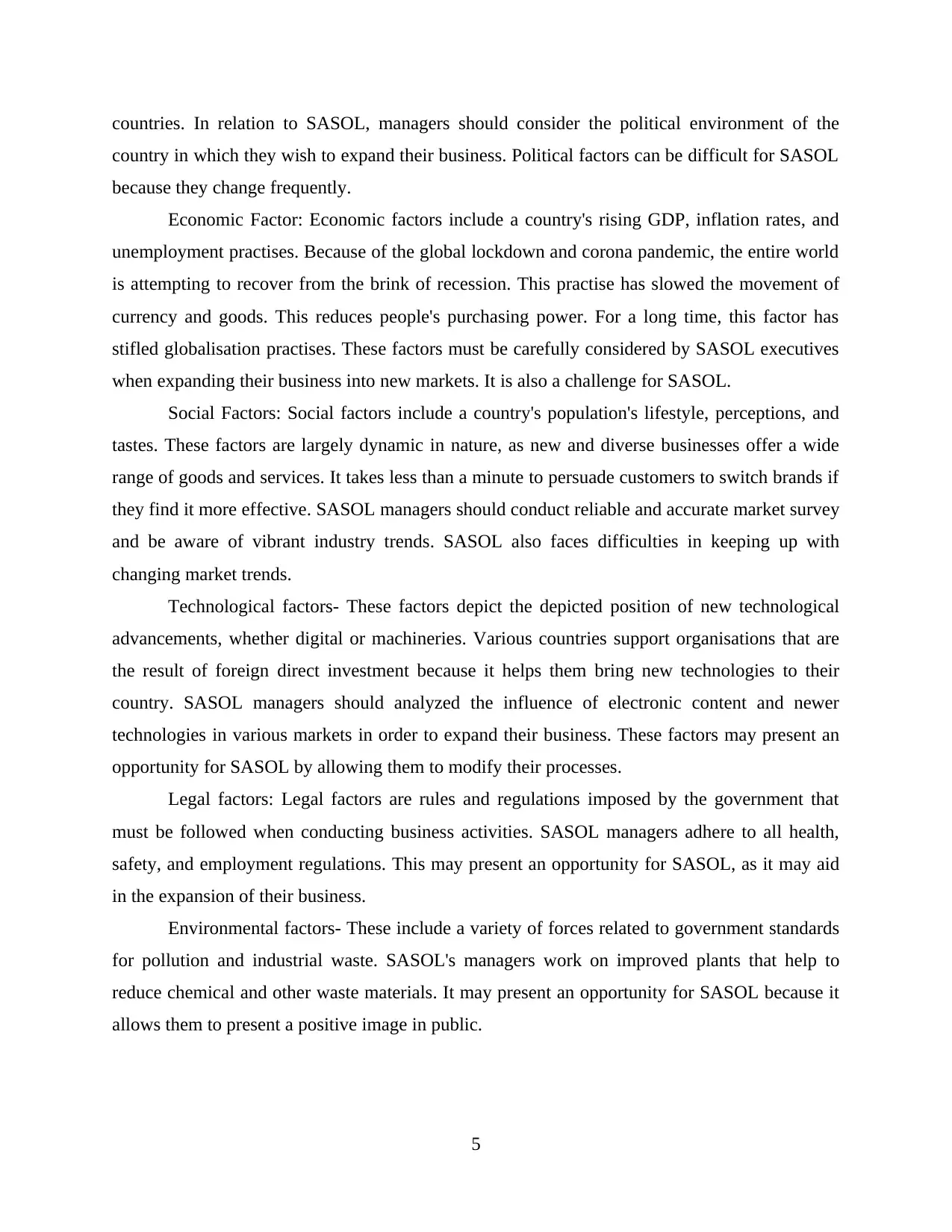
countries. In relation to SASOL, managers should consider the political environment of the
country in which they wish to expand their business. Political factors can be difficult for SASOL
because they change frequently.
Economic Factor: Economic factors include a country's rising GDP, inflation rates, and
unemployment practises. Because of the global lockdown and corona pandemic, the entire world
is attempting to recover from the brink of recession. This practise has slowed the movement of
currency and goods. This reduces people's purchasing power. For a long time, this factor has
stifled globalisation practises. These factors must be carefully considered by SASOL executives
when expanding their business into new markets. It is also a challenge for SASOL.
Social Factors: Social factors include a country's population's lifestyle, perceptions, and
tastes. These factors are largely dynamic in nature, as new and diverse businesses offer a wide
range of goods and services. It takes less than a minute to persuade customers to switch brands if
they find it more effective. SASOL managers should conduct reliable and accurate market survey
and be aware of vibrant industry trends. SASOL also faces difficulties in keeping up with
changing market trends.
Technological factors- These factors depict the depicted position of new technological
advancements, whether digital or machineries. Various countries support organisations that are
the result of foreign direct investment because it helps them bring new technologies to their
country. SASOL managers should analyzed the influence of electronic content and newer
technologies in various markets in order to expand their business. These factors may present an
opportunity for SASOL by allowing them to modify their processes.
Legal factors: Legal factors are rules and regulations imposed by the government that
must be followed when conducting business activities. SASOL managers adhere to all health,
safety, and employment regulations. This may present an opportunity for SASOL, as it may aid
in the expansion of their business.
Environmental factors- These include a variety of forces related to government standards
for pollution and industrial waste. SASOL's managers work on improved plants that help to
reduce chemical and other waste materials. It may present an opportunity for SASOL because it
allows them to present a positive image in public.
5
country in which they wish to expand their business. Political factors can be difficult for SASOL
because they change frequently.
Economic Factor: Economic factors include a country's rising GDP, inflation rates, and
unemployment practises. Because of the global lockdown and corona pandemic, the entire world
is attempting to recover from the brink of recession. This practise has slowed the movement of
currency and goods. This reduces people's purchasing power. For a long time, this factor has
stifled globalisation practises. These factors must be carefully considered by SASOL executives
when expanding their business into new markets. It is also a challenge for SASOL.
Social Factors: Social factors include a country's population's lifestyle, perceptions, and
tastes. These factors are largely dynamic in nature, as new and diverse businesses offer a wide
range of goods and services. It takes less than a minute to persuade customers to switch brands if
they find it more effective. SASOL managers should conduct reliable and accurate market survey
and be aware of vibrant industry trends. SASOL also faces difficulties in keeping up with
changing market trends.
Technological factors- These factors depict the depicted position of new technological
advancements, whether digital or machineries. Various countries support organisations that are
the result of foreign direct investment because it helps them bring new technologies to their
country. SASOL managers should analyzed the influence of electronic content and newer
technologies in various markets in order to expand their business. These factors may present an
opportunity for SASOL by allowing them to modify their processes.
Legal factors: Legal factors are rules and regulations imposed by the government that
must be followed when conducting business activities. SASOL managers adhere to all health,
safety, and employment regulations. This may present an opportunity for SASOL, as it may aid
in the expansion of their business.
Environmental factors- These include a variety of forces related to government standards
for pollution and industrial waste. SASOL's managers work on improved plants that help to
reduce chemical and other waste materials. It may present an opportunity for SASOL because it
allows them to present a positive image in public.
5
Paraphrase This Document
Need a fresh take? Get an instant paraphrase of this document with our AI Paraphraser
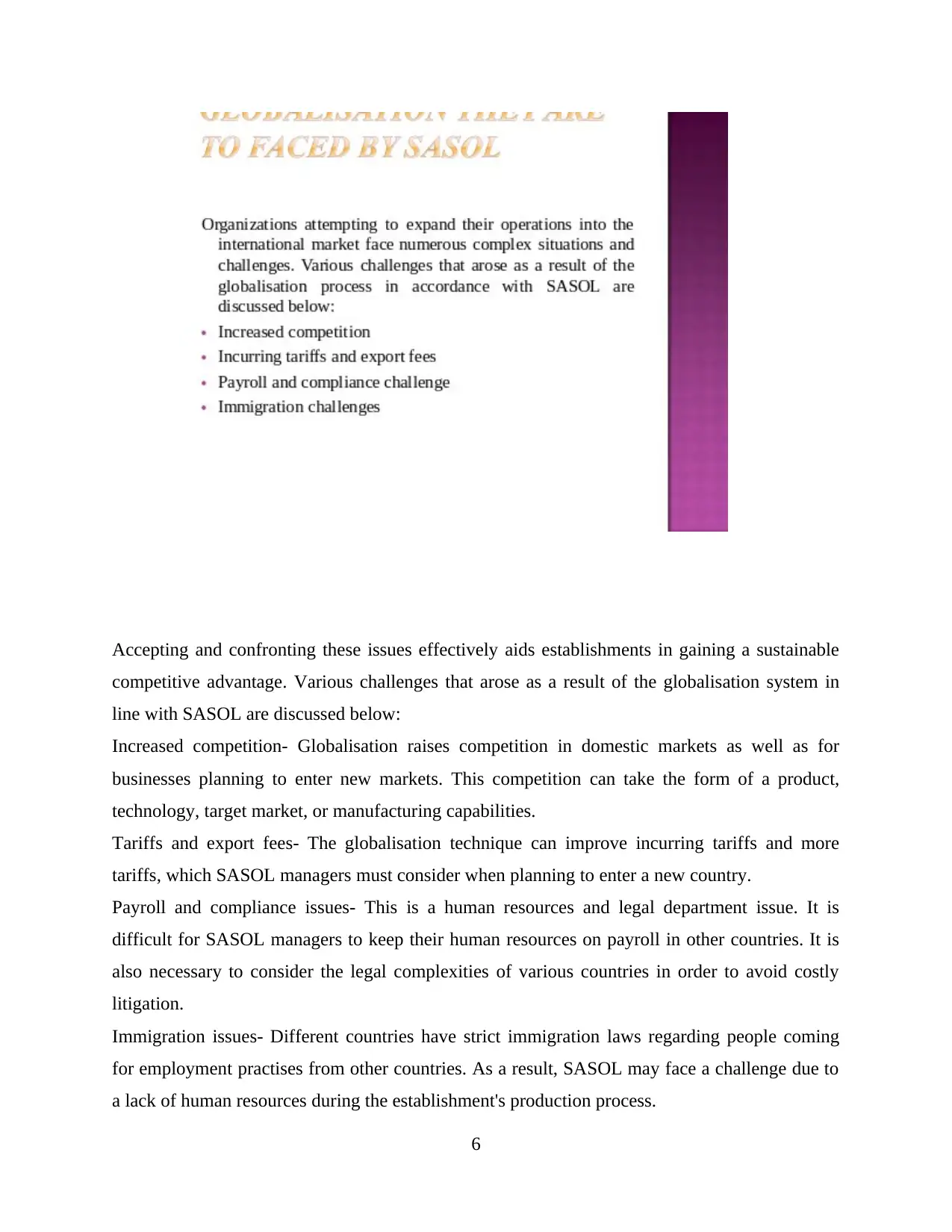
Accepting and confronting these issues effectively aids establishments in gaining a sustainable
competitive advantage. Various challenges that arose as a result of the globalisation system in
line with SASOL are discussed below:
Increased competition- Globalisation raises competition in domestic markets as well as for
businesses planning to enter new markets. This competition can take the form of a product,
technology, target market, or manufacturing capabilities.
Tariffs and export fees- The globalisation technique can improve incurring tariffs and more
tariffs, which SASOL managers must consider when planning to enter a new country.
Payroll and compliance issues- This is a human resources and legal department issue. It is
difficult for SASOL managers to keep their human resources on payroll in other countries. It is
also necessary to consider the legal complexities of various countries in order to avoid costly
litigation.
Immigration issues- Different countries have strict immigration laws regarding people coming
for employment practises from other countries. As a result, SASOL may face a challenge due to
a lack of human resources during the establishment's production process.
6
competitive advantage. Various challenges that arose as a result of the globalisation system in
line with SASOL are discussed below:
Increased competition- Globalisation raises competition in domestic markets as well as for
businesses planning to enter new markets. This competition can take the form of a product,
technology, target market, or manufacturing capabilities.
Tariffs and export fees- The globalisation technique can improve incurring tariffs and more
tariffs, which SASOL managers must consider when planning to enter a new country.
Payroll and compliance issues- This is a human resources and legal department issue. It is
difficult for SASOL managers to keep their human resources on payroll in other countries. It is
also necessary to consider the legal complexities of various countries in order to avoid costly
litigation.
Immigration issues- Different countries have strict immigration laws regarding people coming
for employment practises from other countries. As a result, SASOL may face a challenge due to
a lack of human resources during the establishment's production process.
6
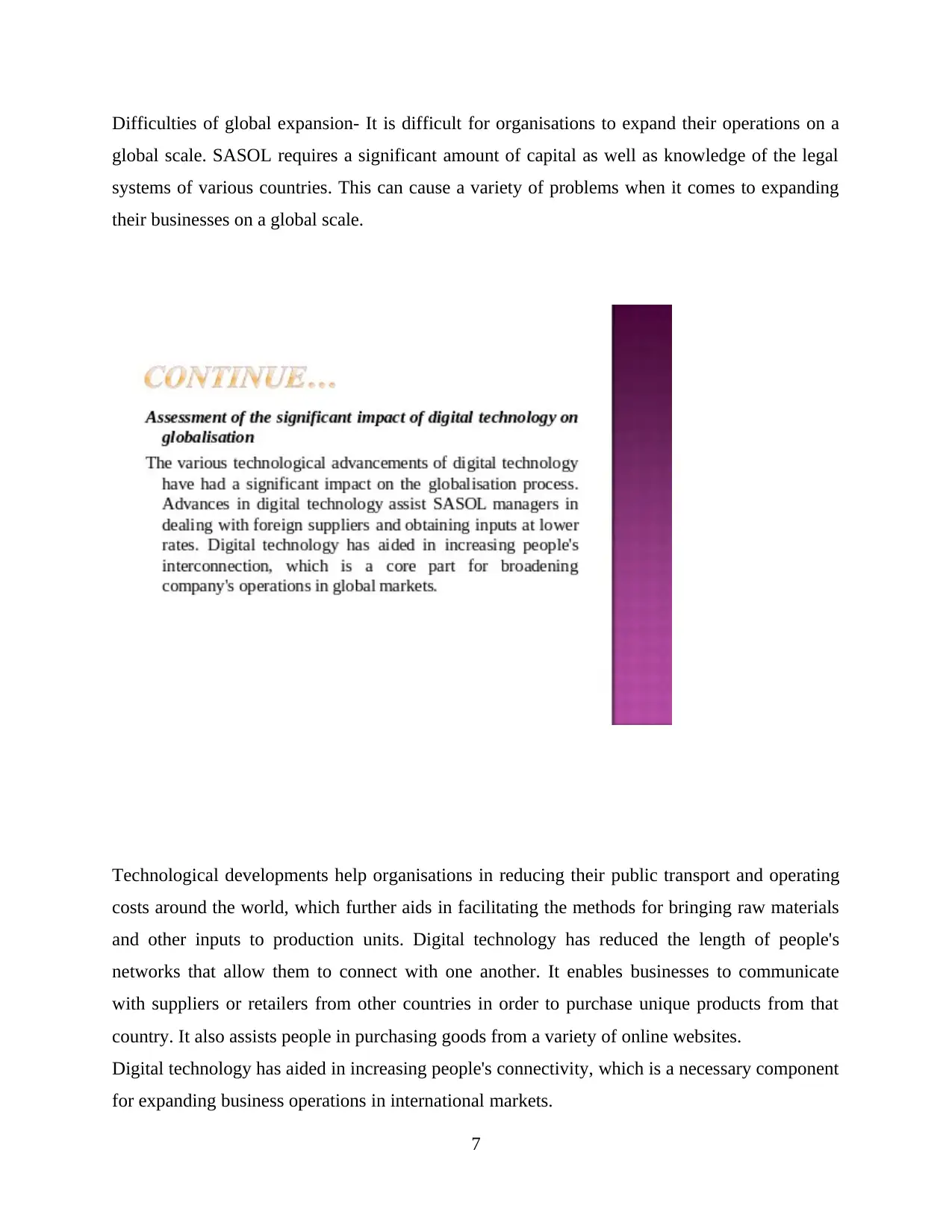
Difficulties of global expansion- It is difficult for organisations to expand their operations on a
global scale. SASOL requires a significant amount of capital as well as knowledge of the legal
systems of various countries. This can cause a variety of problems when it comes to expanding
their businesses on a global scale.
Technological developments help organisations in reducing their public transport and operating
costs around the world, which further aids in facilitating the methods for bringing raw materials
and other inputs to production units. Digital technology has reduced the length of people's
networks that allow them to connect with one another. It enables businesses to communicate
with suppliers or retailers from other countries in order to purchase unique products from that
country. It also assists people in purchasing goods from a variety of online websites.
Digital technology has aided in increasing people's connectivity, which is a necessary component
for expanding business operations in international markets.
7
global scale. SASOL requires a significant amount of capital as well as knowledge of the legal
systems of various countries. This can cause a variety of problems when it comes to expanding
their businesses on a global scale.
Technological developments help organisations in reducing their public transport and operating
costs around the world, which further aids in facilitating the methods for bringing raw materials
and other inputs to production units. Digital technology has reduced the length of people's
networks that allow them to connect with one another. It enables businesses to communicate
with suppliers or retailers from other countries in order to purchase unique products from that
country. It also assists people in purchasing goods from a variety of online websites.
Digital technology has aided in increasing people's connectivity, which is a necessary component
for expanding business operations in international markets.
7
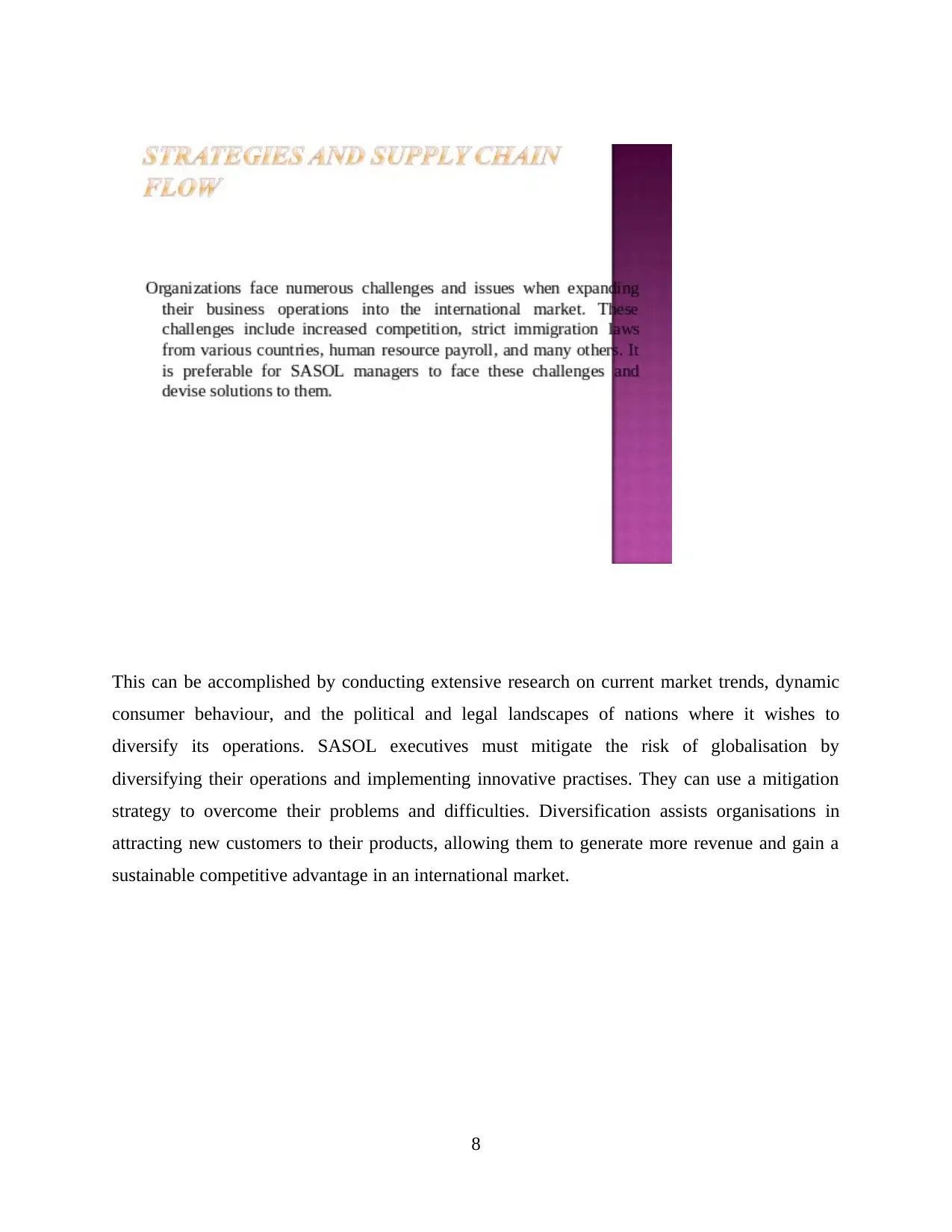
This can be accomplished by conducting extensive research on current market trends, dynamic
consumer behaviour, and the political and legal landscapes of nations where it wishes to
diversify its operations. SASOL executives must mitigate the risk of globalisation by
diversifying their operations and implementing innovative practises. They can use a mitigation
strategy to overcome their problems and difficulties. Diversification assists organisations in
attracting new customers to their products, allowing them to generate more revenue and gain a
sustainable competitive advantage in an international market.
8
consumer behaviour, and the political and legal landscapes of nations where it wishes to
diversify its operations. SASOL executives must mitigate the risk of globalisation by
diversifying their operations and implementing innovative practises. They can use a mitigation
strategy to overcome their problems and difficulties. Diversification assists organisations in
attracting new customers to their products, allowing them to generate more revenue and gain a
sustainable competitive advantage in an international market.
8
Secure Best Marks with AI Grader
Need help grading? Try our AI Grader for instant feedback on your assignments.
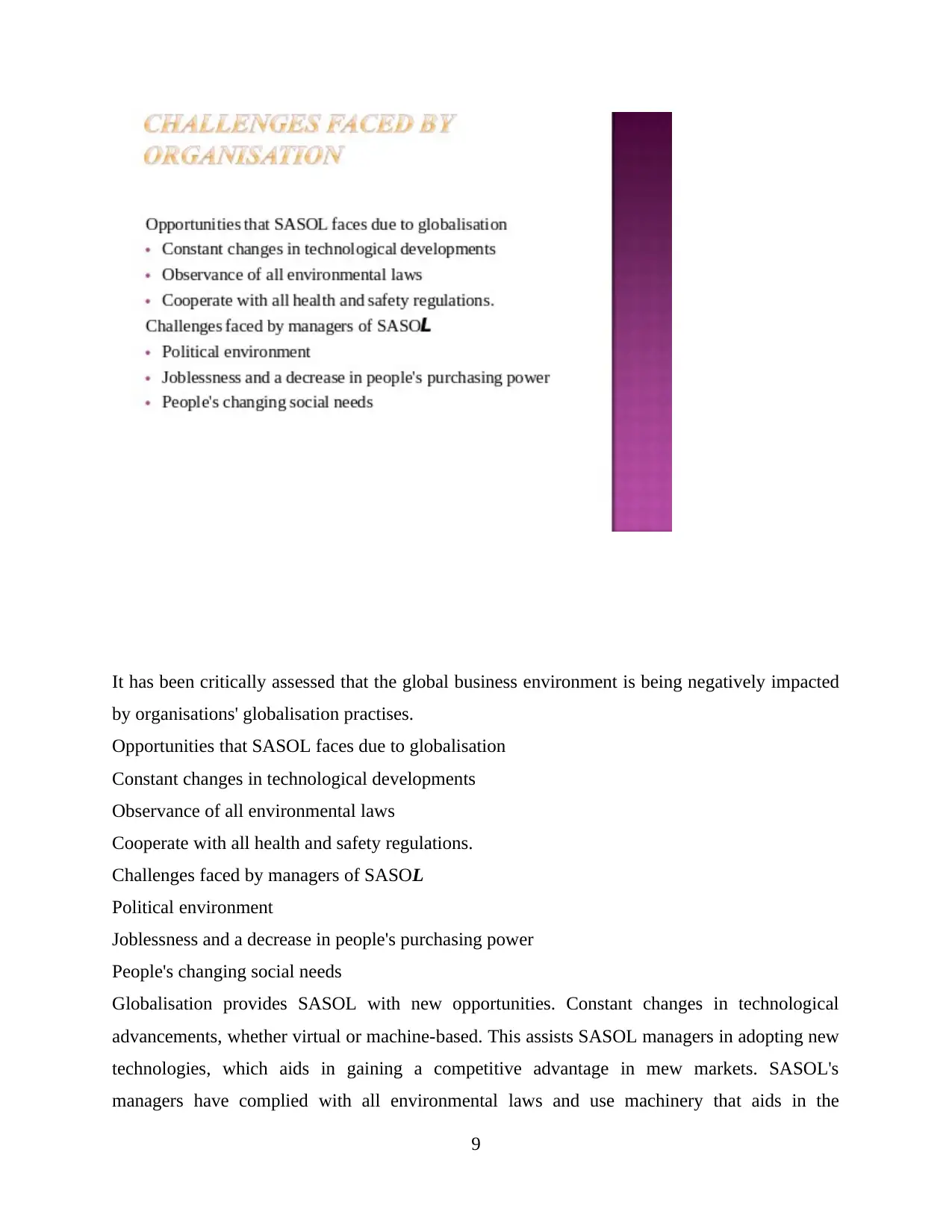
It has been critically assessed that the global business environment is being negatively impacted
by organisations' globalisation practises.
Opportunities that SASOL faces due to globalisation
Constant changes in technological developments
Observance of all environmental laws
Cooperate with all health and safety regulations.
Challenges faced by managers of SASOL
Political environment
Joblessness and a decrease in people's purchasing power
People's changing social needs
Globalisation provides SASOL with new opportunities. Constant changes in technological
advancements, whether virtual or machine-based. This assists SASOL managers in adopting new
technologies, which aids in gaining a competitive advantage in mew markets. SASOL's
managers have complied with all environmental laws and use machinery that aids in the
9
by organisations' globalisation practises.
Opportunities that SASOL faces due to globalisation
Constant changes in technological developments
Observance of all environmental laws
Cooperate with all health and safety regulations.
Challenges faced by managers of SASOL
Political environment
Joblessness and a decrease in people's purchasing power
People's changing social needs
Globalisation provides SASOL with new opportunities. Constant changes in technological
advancements, whether virtual or machine-based. This assists SASOL managers in adopting new
technologies, which aids in gaining a competitive advantage in mew markets. SASOL's
managers have complied with all environmental laws and use machinery that aids in the
9
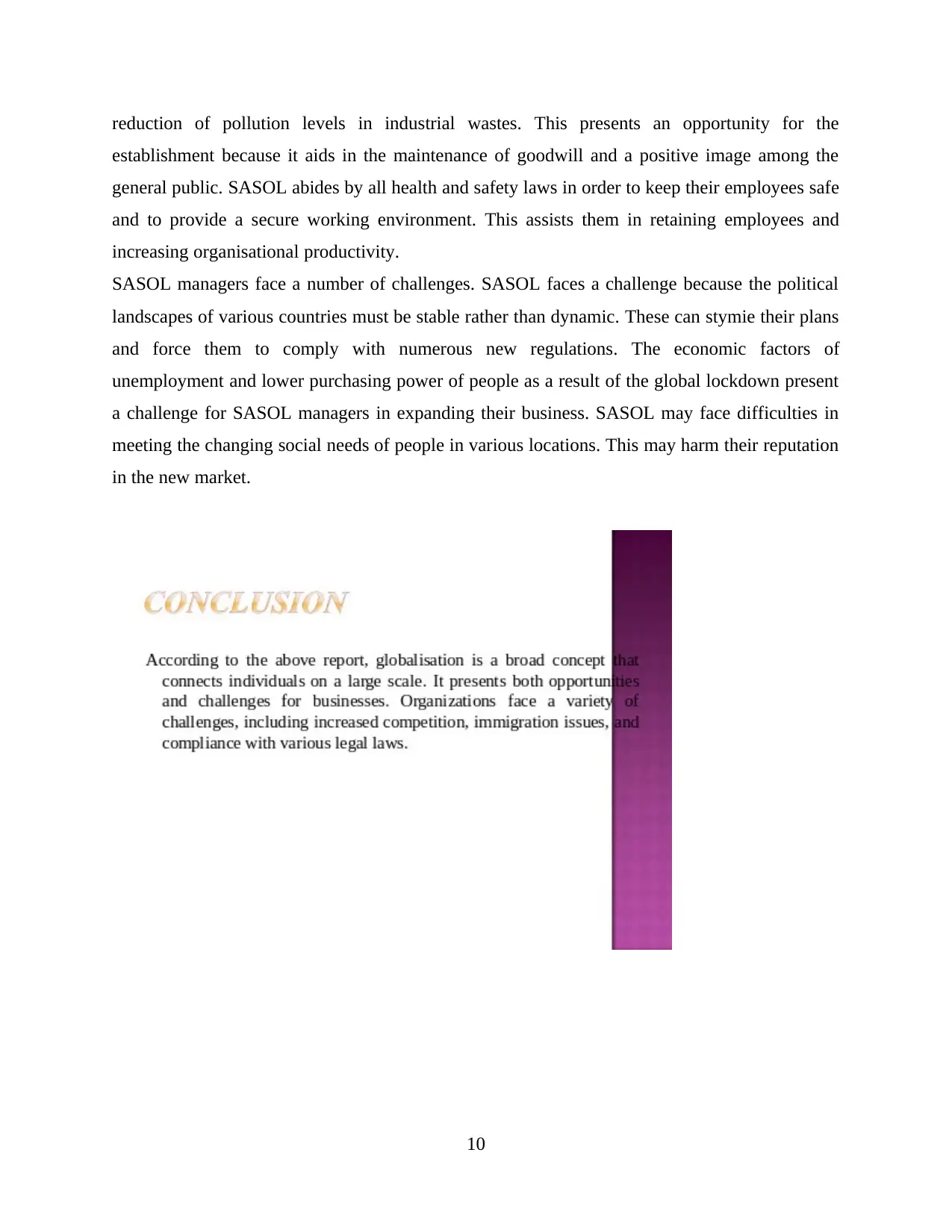
reduction of pollution levels in industrial wastes. This presents an opportunity for the
establishment because it aids in the maintenance of goodwill and a positive image among the
general public. SASOL abides by all health and safety laws in order to keep their employees safe
and to provide a secure working environment. This assists them in retaining employees and
increasing organisational productivity.
SASOL managers face a number of challenges. SASOL faces a challenge because the political
landscapes of various countries must be stable rather than dynamic. These can stymie their plans
and force them to comply with numerous new regulations. The economic factors of
unemployment and lower purchasing power of people as a result of the global lockdown present
a challenge for SASOL managers in expanding their business. SASOL may face difficulties in
meeting the changing social needs of people in various locations. This may harm their reputation
in the new market.
10
establishment because it aids in the maintenance of goodwill and a positive image among the
general public. SASOL abides by all health and safety laws in order to keep their employees safe
and to provide a secure working environment. This assists them in retaining employees and
increasing organisational productivity.
SASOL managers face a number of challenges. SASOL faces a challenge because the political
landscapes of various countries must be stable rather than dynamic. These can stymie their plans
and force them to comply with numerous new regulations. The economic factors of
unemployment and lower purchasing power of people as a result of the global lockdown present
a challenge for SASOL managers in expanding their business. SASOL may face difficulties in
meeting the changing social needs of people in various locations. This may harm their reputation
in the new market.
10
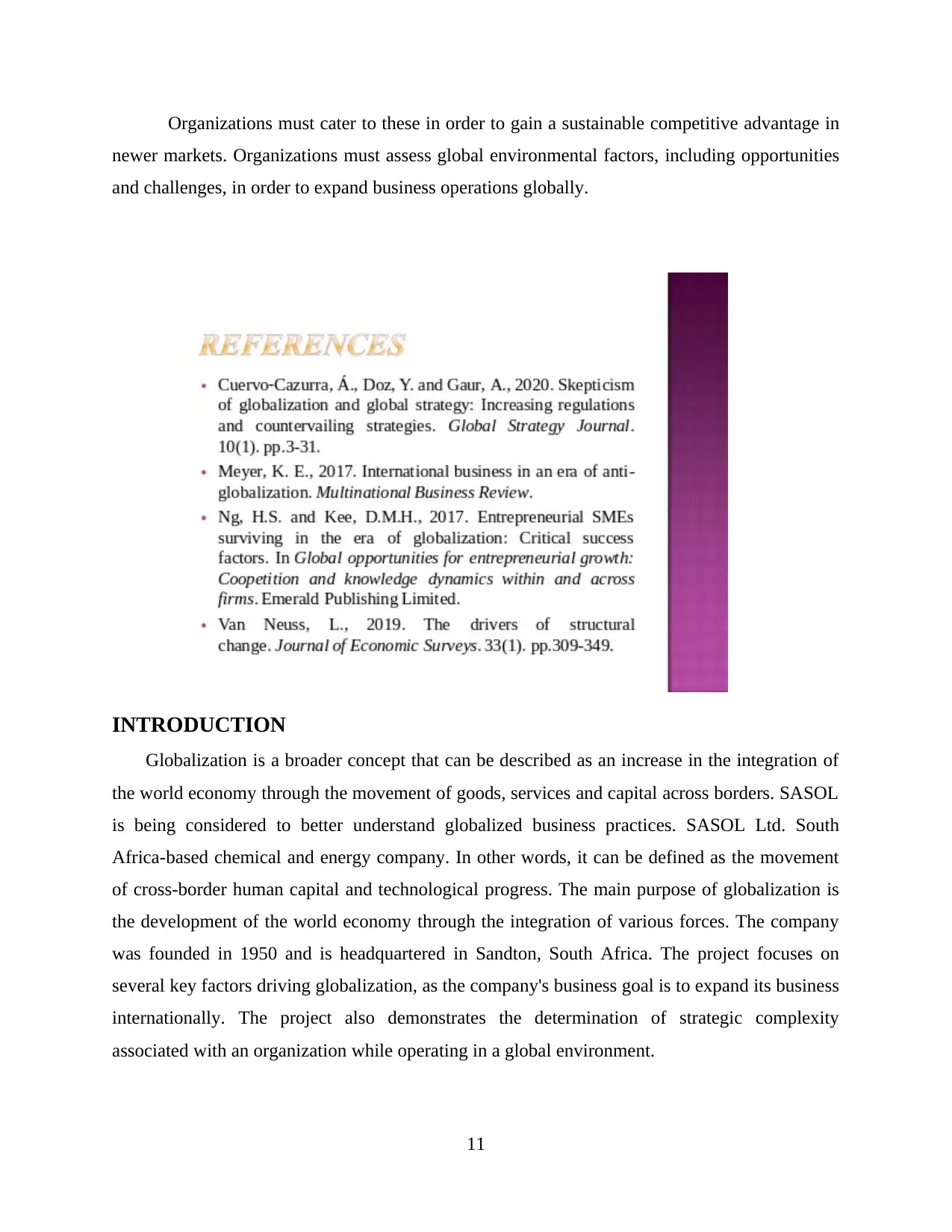
Organizations must cater to these in order to gain a sustainable competitive advantage in
newer markets. Organizations must assess global environmental factors, including opportunities
and challenges, in order to expand business operations globally.
INTRODUCTION
Globalization is a broader concept that can be described as an increase in the integration of
the world economy through the movement of goods, services and capital across borders. SASOL
is being considered to better understand globalized business practices. SASOL Ltd. South
Africa-based chemical and energy company. In other words, it can be defined as the movement
of cross-border human capital and technological progress. The main purpose of globalization is
the development of the world economy through the integration of various forces. The company
was founded in 1950 and is headquartered in Sandton, South Africa. The project focuses on
several key factors driving globalization, as the company's business goal is to expand its business
internationally. The project also demonstrates the determination of strategic complexity
associated with an organization while operating in a global environment.
11
newer markets. Organizations must assess global environmental factors, including opportunities
and challenges, in order to expand business operations globally.
INTRODUCTION
Globalization is a broader concept that can be described as an increase in the integration of
the world economy through the movement of goods, services and capital across borders. SASOL
is being considered to better understand globalized business practices. SASOL Ltd. South
Africa-based chemical and energy company. In other words, it can be defined as the movement
of cross-border human capital and technological progress. The main purpose of globalization is
the development of the world economy through the integration of various forces. The company
was founded in 1950 and is headquartered in Sandton, South Africa. The project focuses on
several key factors driving globalization, as the company's business goal is to expand its business
internationally. The project also demonstrates the determination of strategic complexity
associated with an organization while operating in a global environment.
11
Paraphrase This Document
Need a fresh take? Get an instant paraphrase of this document with our AI Paraphraser
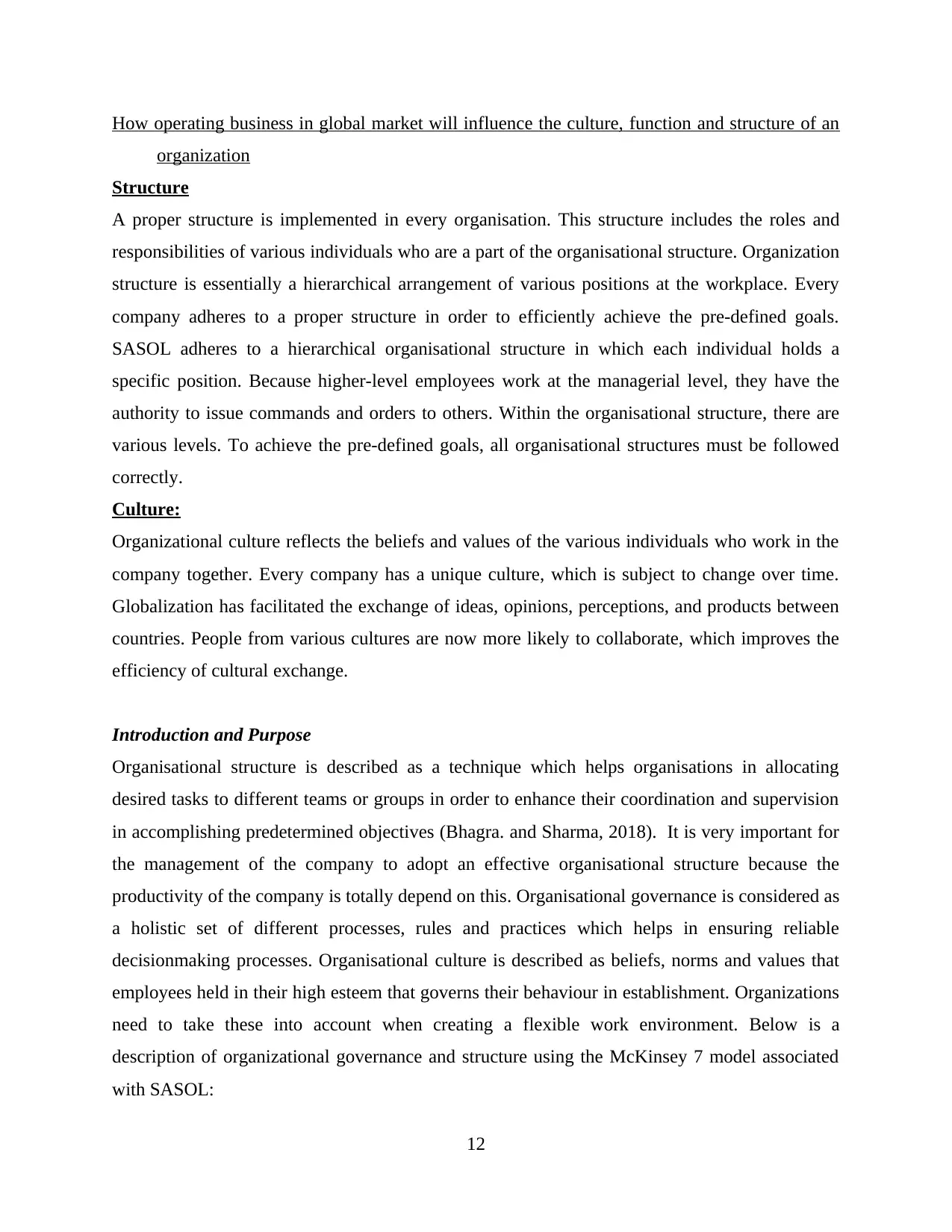
How operating business in global market will influence the culture, function and structure of an
organization
Structure
A proper structure is implemented in every organisation. This structure includes the roles and
responsibilities of various individuals who are a part of the organisational structure. Organization
structure is essentially a hierarchical arrangement of various positions at the workplace. Every
company adheres to a proper structure in order to efficiently achieve the pre-defined goals.
SASOL adheres to a hierarchical organisational structure in which each individual holds a
specific position. Because higher-level employees work at the managerial level, they have the
authority to issue commands and orders to others. Within the organisational structure, there are
various levels. To achieve the pre-defined goals, all organisational structures must be followed
correctly.
Culture:
Organizational culture reflects the beliefs and values of the various individuals who work in the
company together. Every company has a unique culture, which is subject to change over time.
Globalization has facilitated the exchange of ideas, opinions, perceptions, and products between
countries. People from various cultures are now more likely to collaborate, which improves the
efficiency of cultural exchange.
Introduction and Purpose
Organisational structure is described as a technique which helps organisations in allocating
desired tasks to different teams or groups in order to enhance their coordination and supervision
in accomplishing predetermined objectives (Bhagra. and Sharma, 2018). It is very important for
the management of the company to adopt an effective organisational structure because the
productivity of the company is totally depend on this. Organisational governance is considered as
a holistic set of different processes, rules and practices which helps in ensuring reliable
decisionmaking processes. Organisational culture is described as beliefs, norms and values that
employees held in their high esteem that governs their behaviour in establishment. Organizations
need to take these into account when creating a flexible work environment. Below is a
description of organizational governance and structure using the McKinsey 7 model associated
with SASOL:
12
organization
Structure
A proper structure is implemented in every organisation. This structure includes the roles and
responsibilities of various individuals who are a part of the organisational structure. Organization
structure is essentially a hierarchical arrangement of various positions at the workplace. Every
company adheres to a proper structure in order to efficiently achieve the pre-defined goals.
SASOL adheres to a hierarchical organisational structure in which each individual holds a
specific position. Because higher-level employees work at the managerial level, they have the
authority to issue commands and orders to others. Within the organisational structure, there are
various levels. To achieve the pre-defined goals, all organisational structures must be followed
correctly.
Culture:
Organizational culture reflects the beliefs and values of the various individuals who work in the
company together. Every company has a unique culture, which is subject to change over time.
Globalization has facilitated the exchange of ideas, opinions, perceptions, and products between
countries. People from various cultures are now more likely to collaborate, which improves the
efficiency of cultural exchange.
Introduction and Purpose
Organisational structure is described as a technique which helps organisations in allocating
desired tasks to different teams or groups in order to enhance their coordination and supervision
in accomplishing predetermined objectives (Bhagra. and Sharma, 2018). It is very important for
the management of the company to adopt an effective organisational structure because the
productivity of the company is totally depend on this. Organisational governance is considered as
a holistic set of different processes, rules and practices which helps in ensuring reliable
decisionmaking processes. Organisational culture is described as beliefs, norms and values that
employees held in their high esteem that governs their behaviour in establishment. Organizations
need to take these into account when creating a flexible work environment. Below is a
description of organizational governance and structure using the McKinsey 7 model associated
with SASOL:
12
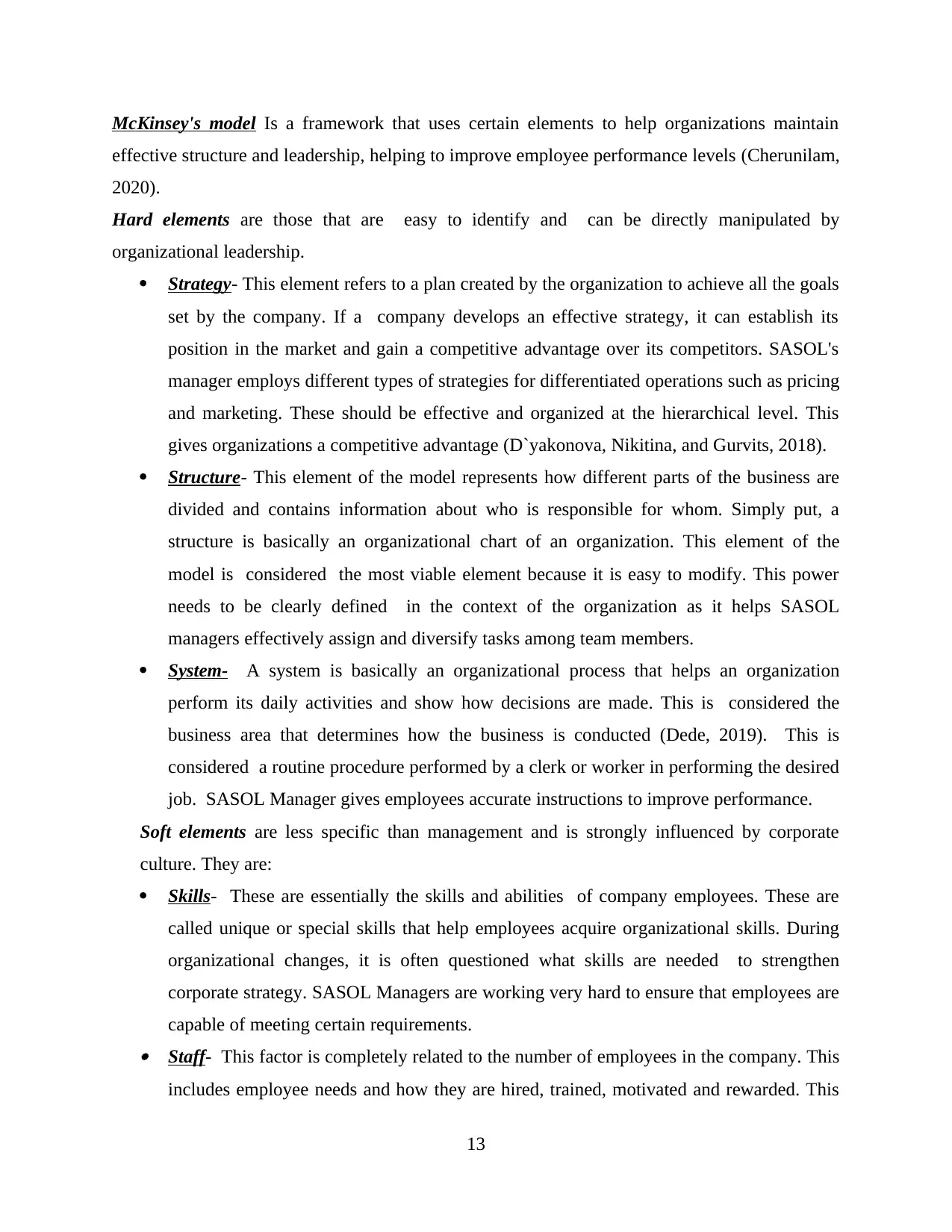
McKinsey's model Is a framework that uses certain elements to help organizations maintain
effective structure and leadership, helping to improve employee performance levels (Cherunilam,
2020).
Hard elements are those that are easy to identify and can be directly manipulated by
organizational leadership.
Strategy- This element refers to a plan created by the organization to achieve all the goals
set by the company. If a company develops an effective strategy, it can establish its
position in the market and gain a competitive advantage over its competitors. SASOL's
manager employs different types of strategies for differentiated operations such as pricing
and marketing. These should be effective and organized at the hierarchical level. This
gives organizations a competitive advantage (D`yakonova, Nikitina, and Gurvits, 2018).
Structure- This element of the model represents how different parts of the business are
divided and contains information about who is responsible for whom. Simply put, a
structure is basically an organizational chart of an organization. This element of the
model is considered the most viable element because it is easy to modify. This power
needs to be clearly defined in the context of the organization as it helps SASOL
managers effectively assign and diversify tasks among team members.
System- A system is basically an organizational process that helps an organization
perform its daily activities and show how decisions are made. This is considered the
business area that determines how the business is conducted (Dede, 2019). This is
considered a routine procedure performed by a clerk or worker in performing the desired
job. SASOL Manager gives employees accurate instructions to improve performance.
Soft elements are less specific than management and is strongly influenced by corporate
culture. They are:
Skills- These are essentially the skills and abilities of company employees. These are
called unique or special skills that help employees acquire organizational skills. During
organizational changes, it is often questioned what skills are needed to strengthen
corporate strategy. SASOL Managers are working very hard to ensure that employees are
capable of meeting certain requirements. Staff- This factor is completely related to the number of employees in the company. This
includes employee needs and how they are hired, trained, motivated and rewarded. This
13
effective structure and leadership, helping to improve employee performance levels (Cherunilam,
2020).
Hard elements are those that are easy to identify and can be directly manipulated by
organizational leadership.
Strategy- This element refers to a plan created by the organization to achieve all the goals
set by the company. If a company develops an effective strategy, it can establish its
position in the market and gain a competitive advantage over its competitors. SASOL's
manager employs different types of strategies for differentiated operations such as pricing
and marketing. These should be effective and organized at the hierarchical level. This
gives organizations a competitive advantage (D`yakonova, Nikitina, and Gurvits, 2018).
Structure- This element of the model represents how different parts of the business are
divided and contains information about who is responsible for whom. Simply put, a
structure is basically an organizational chart of an organization. This element of the
model is considered the most viable element because it is easy to modify. This power
needs to be clearly defined in the context of the organization as it helps SASOL
managers effectively assign and diversify tasks among team members.
System- A system is basically an organizational process that helps an organization
perform its daily activities and show how decisions are made. This is considered the
business area that determines how the business is conducted (Dede, 2019). This is
considered a routine procedure performed by a clerk or worker in performing the desired
job. SASOL Manager gives employees accurate instructions to improve performance.
Soft elements are less specific than management and is strongly influenced by corporate
culture. They are:
Skills- These are essentially the skills and abilities of company employees. These are
called unique or special skills that help employees acquire organizational skills. During
organizational changes, it is often questioned what skills are needed to strengthen
corporate strategy. SASOL Managers are working very hard to ensure that employees are
capable of meeting certain requirements. Staff- This factor is completely related to the number of employees in the company. This
includes employee needs and how they are hired, trained, motivated and rewarded. This
13
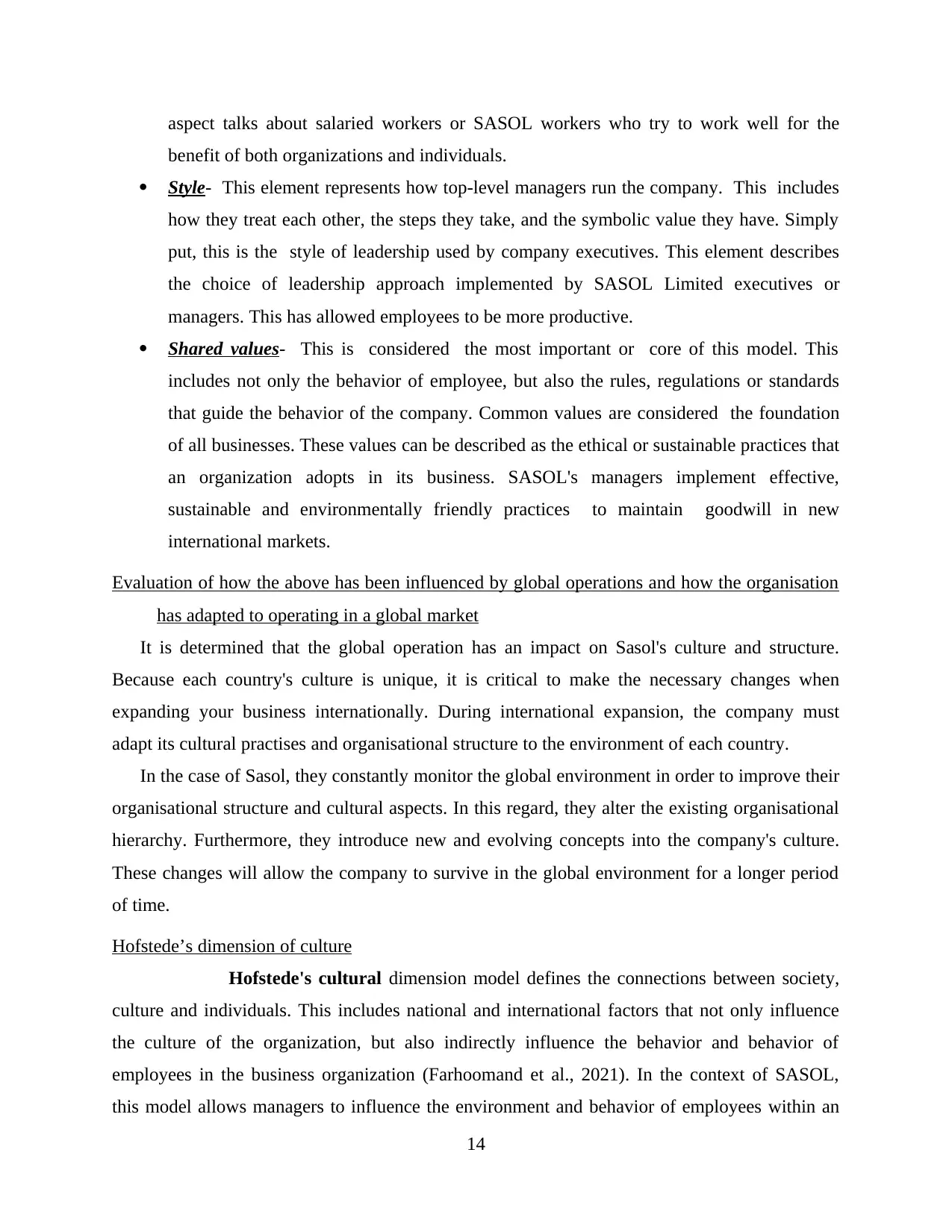
aspect talks about salaried workers or SASOL workers who try to work well for the
benefit of both organizations and individuals.
Style- This element represents how top-level managers run the company. This includes
how they treat each other, the steps they take, and the symbolic value they have. Simply
put, this is the style of leadership used by company executives. This element describes
the choice of leadership approach implemented by SASOL Limited executives or
managers. This has allowed employees to be more productive.
Shared values- This is considered the most important or core of this model. This
includes not only the behavior of employee, but also the rules, regulations or standards
that guide the behavior of the company. Common values are considered the foundation
of all businesses. These values can be described as the ethical or sustainable practices that
an organization adopts in its business. SASOL's managers implement effective,
sustainable and environmentally friendly practices to maintain goodwill in new
international markets.
Evaluation of how the above has been influenced by global operations and how the organisation
has adapted to operating in a global market
It is determined that the global operation has an impact on Sasol's culture and structure.
Because each country's culture is unique, it is critical to make the necessary changes when
expanding your business internationally. During international expansion, the company must
adapt its cultural practises and organisational structure to the environment of each country.
In the case of Sasol, they constantly monitor the global environment in order to improve their
organisational structure and cultural aspects. In this regard, they alter the existing organisational
hierarchy. Furthermore, they introduce new and evolving concepts into the company's culture.
These changes will allow the company to survive in the global environment for a longer period
of time.
Hofstede’s dimension of culture
Hofstede's cultural dimension model defines the connections between society,
culture and individuals. This includes national and international factors that not only influence
the culture of the organization, but also indirectly influence the behavior and behavior of
employees in the business organization (Farhoomand et al., 2021). In the context of SASOL,
this model allows managers to influence the environment and behavior of employees within an
14
benefit of both organizations and individuals.
Style- This element represents how top-level managers run the company. This includes
how they treat each other, the steps they take, and the symbolic value they have. Simply
put, this is the style of leadership used by company executives. This element describes
the choice of leadership approach implemented by SASOL Limited executives or
managers. This has allowed employees to be more productive.
Shared values- This is considered the most important or core of this model. This
includes not only the behavior of employee, but also the rules, regulations or standards
that guide the behavior of the company. Common values are considered the foundation
of all businesses. These values can be described as the ethical or sustainable practices that
an organization adopts in its business. SASOL's managers implement effective,
sustainable and environmentally friendly practices to maintain goodwill in new
international markets.
Evaluation of how the above has been influenced by global operations and how the organisation
has adapted to operating in a global market
It is determined that the global operation has an impact on Sasol's culture and structure.
Because each country's culture is unique, it is critical to make the necessary changes when
expanding your business internationally. During international expansion, the company must
adapt its cultural practises and organisational structure to the environment of each country.
In the case of Sasol, they constantly monitor the global environment in order to improve their
organisational structure and cultural aspects. In this regard, they alter the existing organisational
hierarchy. Furthermore, they introduce new and evolving concepts into the company's culture.
These changes will allow the company to survive in the global environment for a longer period
of time.
Hofstede’s dimension of culture
Hofstede's cultural dimension model defines the connections between society,
culture and individuals. This includes national and international factors that not only influence
the culture of the organization, but also indirectly influence the behavior and behavior of
employees in the business organization (Farhoomand et al., 2021). In the context of SASOL,
this model allows managers to influence the environment and behavior of employees within an
14
Secure Best Marks with AI Grader
Need help grading? Try our AI Grader for instant feedback on your assignments.
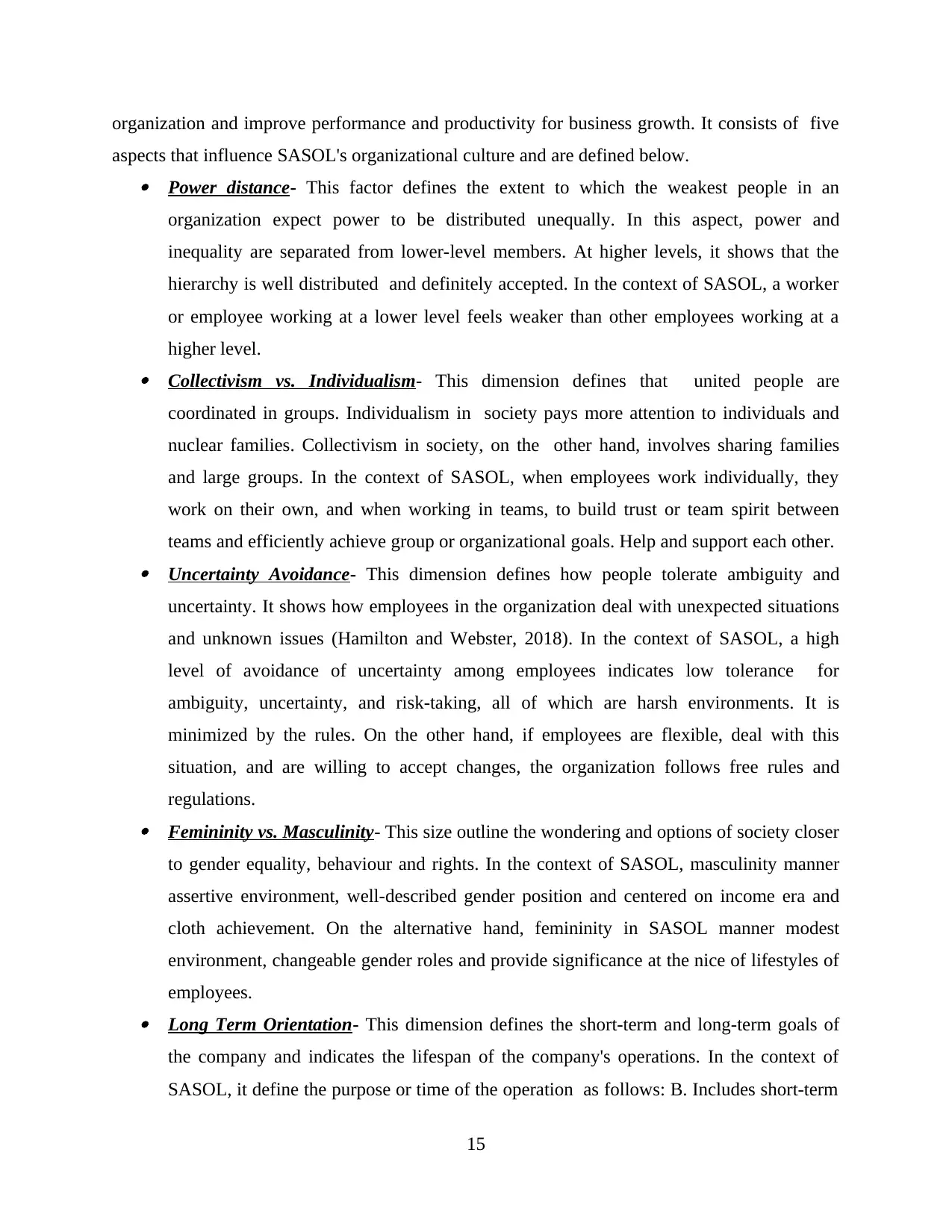
organization and improve performance and productivity for business growth. It consists of five
aspects that influence SASOL's organizational culture and are defined below. Power distance- This factor defines the extent to which the weakest people in an
organization expect power to be distributed unequally. In this aspect, power and
inequality are separated from lower-level members. At higher levels, it shows that the
hierarchy is well distributed and definitely accepted. In the context of SASOL, a worker
or employee working at a lower level feels weaker than other employees working at a
higher level. Collectivism vs. Individualism- This dimension defines that united people are
coordinated in groups. Individualism in society pays more attention to individuals and
nuclear families. Collectivism in society, on the other hand, involves sharing families
and large groups. In the context of SASOL, when employees work individually, they
work on their own, and when working in teams, to build trust or team spirit between
teams and efficiently achieve group or organizational goals. Help and support each other. Uncertainty Avoidance- This dimension defines how people tolerate ambiguity and
uncertainty. It shows how employees in the organization deal with unexpected situations
and unknown issues (Hamilton and Webster, 2018). In the context of SASOL, a high
level of avoidance of uncertainty among employees indicates low tolerance for
ambiguity, uncertainty, and risk-taking, all of which are harsh environments. It is
minimized by the rules. On the other hand, if employees are flexible, deal with this
situation, and are willing to accept changes, the organization follows free rules and
regulations. Femininity vs. Masculinity- This size outline the wondering and options of society closer
to gender equality, behaviour and rights. In the context of SASOL, masculinity manner
assertive environment, well-described gender position and centered on income era and
cloth achievement. On the alternative hand, femininity in SASOL manner modest
environment, changeable gender roles and provide significance at the nice of lifestyles of
employees. Long Term Orientation- This dimension defines the short-term and long-term goals of
the company and indicates the lifespan of the company's operations. In the context of
SASOL, it define the purpose or time of the operation as follows: B. Includes short-term
15
aspects that influence SASOL's organizational culture and are defined below. Power distance- This factor defines the extent to which the weakest people in an
organization expect power to be distributed unequally. In this aspect, power and
inequality are separated from lower-level members. At higher levels, it shows that the
hierarchy is well distributed and definitely accepted. In the context of SASOL, a worker
or employee working at a lower level feels weaker than other employees working at a
higher level. Collectivism vs. Individualism- This dimension defines that united people are
coordinated in groups. Individualism in society pays more attention to individuals and
nuclear families. Collectivism in society, on the other hand, involves sharing families
and large groups. In the context of SASOL, when employees work individually, they
work on their own, and when working in teams, to build trust or team spirit between
teams and efficiently achieve group or organizational goals. Help and support each other. Uncertainty Avoidance- This dimension defines how people tolerate ambiguity and
uncertainty. It shows how employees in the organization deal with unexpected situations
and unknown issues (Hamilton and Webster, 2018). In the context of SASOL, a high
level of avoidance of uncertainty among employees indicates low tolerance for
ambiguity, uncertainty, and risk-taking, all of which are harsh environments. It is
minimized by the rules. On the other hand, if employees are flexible, deal with this
situation, and are willing to accept changes, the organization follows free rules and
regulations. Femininity vs. Masculinity- This size outline the wondering and options of society closer
to gender equality, behaviour and rights. In the context of SASOL, masculinity manner
assertive environment, well-described gender position and centered on income era and
cloth achievement. On the alternative hand, femininity in SASOL manner modest
environment, changeable gender roles and provide significance at the nice of lifestyles of
employees. Long Term Orientation- This dimension defines the short-term and long-term goals of
the company and indicates the lifespan of the company's operations. In the context of
SASOL, it define the purpose or time of the operation as follows: B. Includes short-term
15
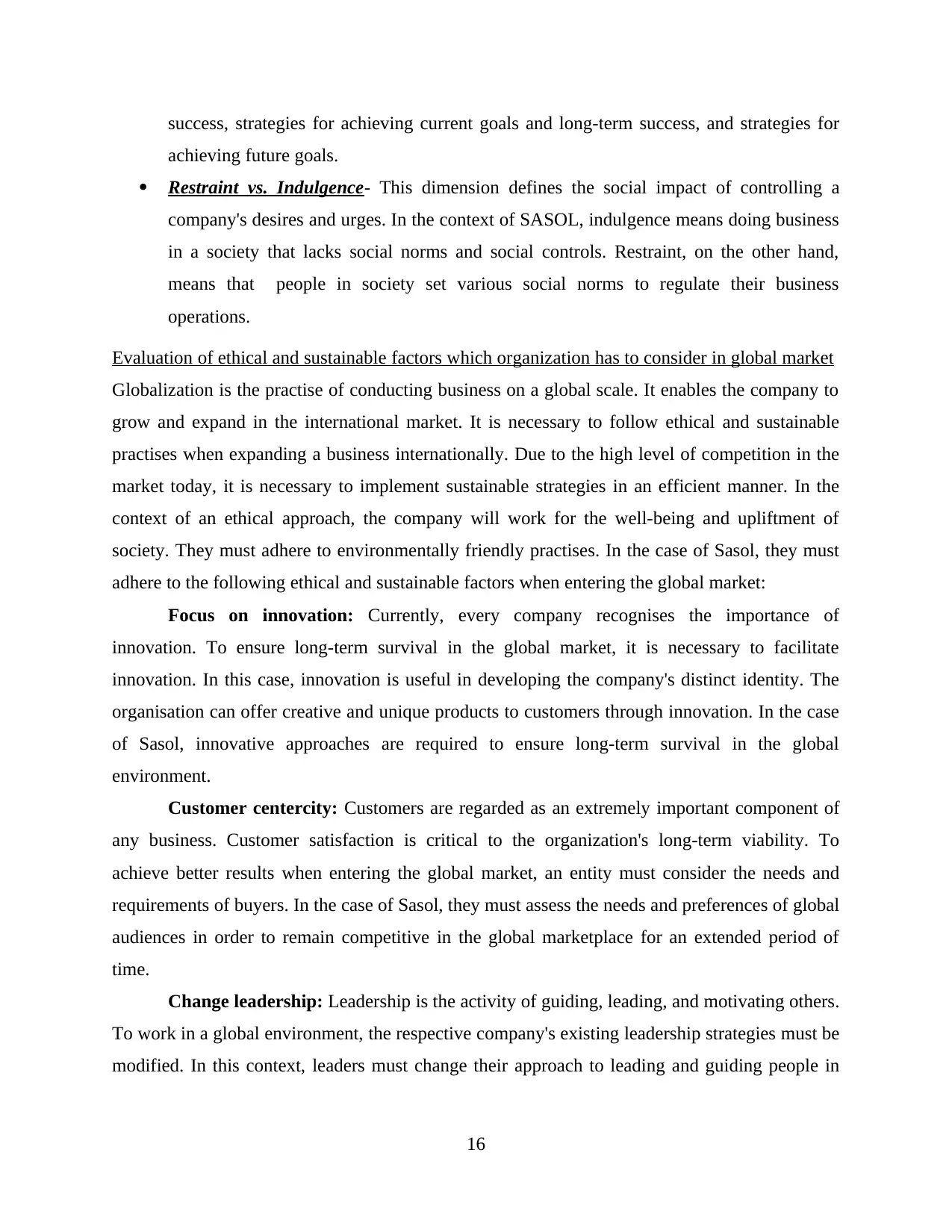
success, strategies for achieving current goals and long-term success, and strategies for
achieving future goals.
Restraint vs. Indulgence- This dimension defines the social impact of controlling a
company's desires and urges. In the context of SASOL, indulgence means doing business
in a society that lacks social norms and social controls. Restraint, on the other hand,
means that people in society set various social norms to regulate their business
operations.
Evaluation of ethical and sustainable factors which organization has to consider in global market
Globalization is the practise of conducting business on a global scale. It enables the company to
grow and expand in the international market. It is necessary to follow ethical and sustainable
practises when expanding a business internationally. Due to the high level of competition in the
market today, it is necessary to implement sustainable strategies in an efficient manner. In the
context of an ethical approach, the company will work for the well-being and upliftment of
society. They must adhere to environmentally friendly practises. In the case of Sasol, they must
adhere to the following ethical and sustainable factors when entering the global market:
Focus on innovation: Currently, every company recognises the importance of
innovation. To ensure long-term survival in the global market, it is necessary to facilitate
innovation. In this case, innovation is useful in developing the company's distinct identity. The
organisation can offer creative and unique products to customers through innovation. In the case
of Sasol, innovative approaches are required to ensure long-term survival in the global
environment.
Customer centercity: Customers are regarded as an extremely important component of
any business. Customer satisfaction is critical to the organization's long-term viability. To
achieve better results when entering the global market, an entity must consider the needs and
requirements of buyers. In the case of Sasol, they must assess the needs and preferences of global
audiences in order to remain competitive in the global marketplace for an extended period of
time.
Change leadership: Leadership is the activity of guiding, leading, and motivating others.
To work in a global environment, the respective company's existing leadership strategies must be
modified. In this context, leaders must change their approach to leading and guiding people in
16
achieving future goals.
Restraint vs. Indulgence- This dimension defines the social impact of controlling a
company's desires and urges. In the context of SASOL, indulgence means doing business
in a society that lacks social norms and social controls. Restraint, on the other hand,
means that people in society set various social norms to regulate their business
operations.
Evaluation of ethical and sustainable factors which organization has to consider in global market
Globalization is the practise of conducting business on a global scale. It enables the company to
grow and expand in the international market. It is necessary to follow ethical and sustainable
practises when expanding a business internationally. Due to the high level of competition in the
market today, it is necessary to implement sustainable strategies in an efficient manner. In the
context of an ethical approach, the company will work for the well-being and upliftment of
society. They must adhere to environmentally friendly practises. In the case of Sasol, they must
adhere to the following ethical and sustainable factors when entering the global market:
Focus on innovation: Currently, every company recognises the importance of
innovation. To ensure long-term survival in the global market, it is necessary to facilitate
innovation. In this case, innovation is useful in developing the company's distinct identity. The
organisation can offer creative and unique products to customers through innovation. In the case
of Sasol, innovative approaches are required to ensure long-term survival in the global
environment.
Customer centercity: Customers are regarded as an extremely important component of
any business. Customer satisfaction is critical to the organization's long-term viability. To
achieve better results when entering the global market, an entity must consider the needs and
requirements of buyers. In the case of Sasol, they must assess the needs and preferences of global
audiences in order to remain competitive in the global marketplace for an extended period of
time.
Change leadership: Leadership is the activity of guiding, leading, and motivating others.
To work in a global environment, the respective company's existing leadership strategies must be
modified. In this context, leaders must change their approach to leading and guiding people in
16
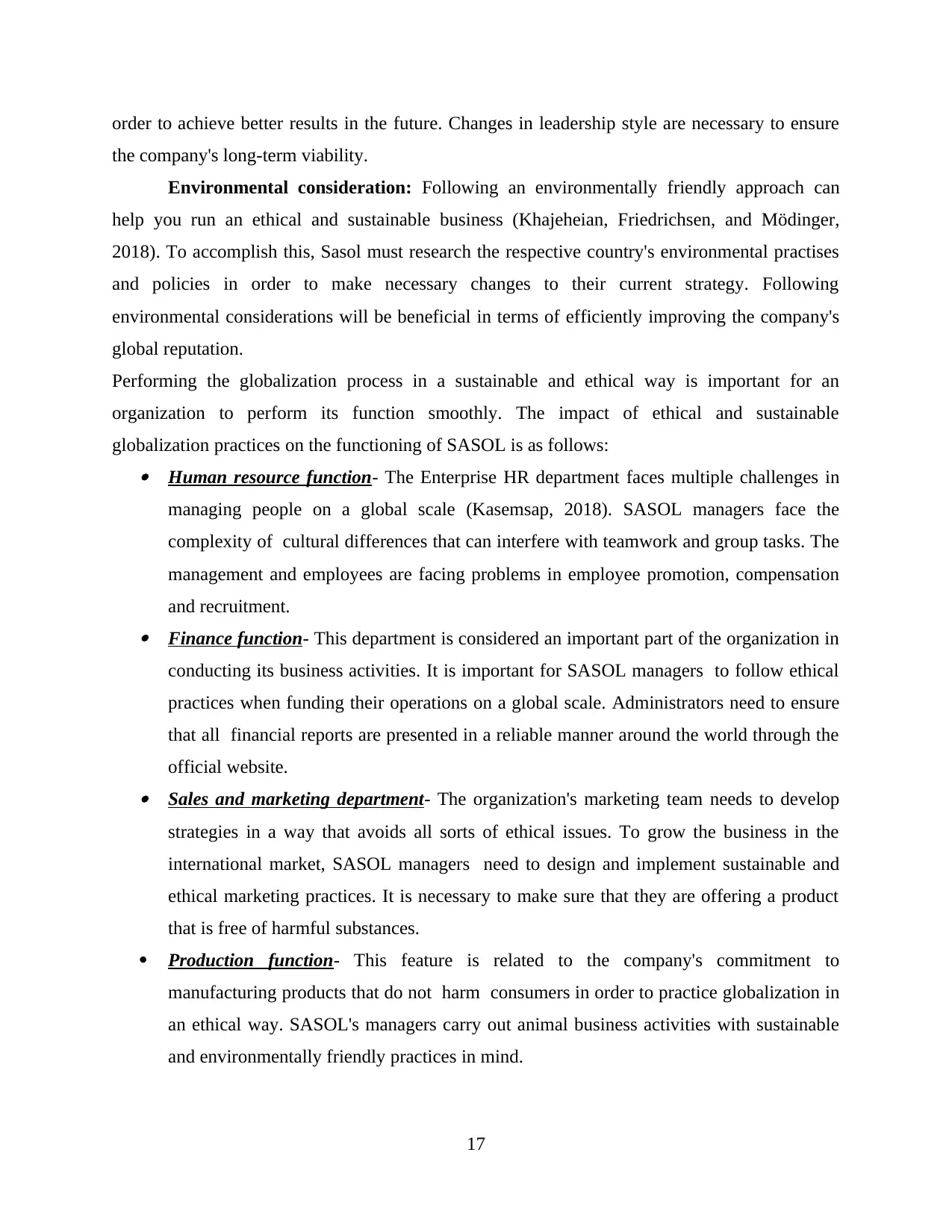
order to achieve better results in the future. Changes in leadership style are necessary to ensure
the company's long-term viability.
Environmental consideration: Following an environmentally friendly approach can
help you run an ethical and sustainable business (Khajeheian, Friedrichsen, and Mödinger,
2018). To accomplish this, Sasol must research the respective country's environmental practises
and policies in order to make necessary changes to their current strategy. Following
environmental considerations will be beneficial in terms of efficiently improving the company's
global reputation.
Performing the globalization process in a sustainable and ethical way is important for an
organization to perform its function smoothly. The impact of ethical and sustainable
globalization practices on the functioning of SASOL is as follows: Human resource function- The Enterprise HR department faces multiple challenges in
managing people on a global scale (Kasemsap, 2018). SASOL managers face the
complexity of cultural differences that can interfere with teamwork and group tasks. The
management and employees are facing problems in employee promotion, compensation
and recruitment. Finance function- This department is considered an important part of the organization in
conducting its business activities. It is important for SASOL managers to follow ethical
practices when funding their operations on a global scale. Administrators need to ensure
that all financial reports are presented in a reliable manner around the world through the
official website. Sales and marketing department- The organization's marketing team needs to develop
strategies in a way that avoids all sorts of ethical issues. To grow the business in the
international market, SASOL managers need to design and implement sustainable and
ethical marketing practices. It is necessary to make sure that they are offering a product
that is free of harmful substances.
Production function- This feature is related to the company's commitment to
manufacturing products that do not harm consumers in order to practice globalization in
an ethical way. SASOL's managers carry out animal business activities with sustainable
and environmentally friendly practices in mind.
17
the company's long-term viability.
Environmental consideration: Following an environmentally friendly approach can
help you run an ethical and sustainable business (Khajeheian, Friedrichsen, and Mödinger,
2018). To accomplish this, Sasol must research the respective country's environmental practises
and policies in order to make necessary changes to their current strategy. Following
environmental considerations will be beneficial in terms of efficiently improving the company's
global reputation.
Performing the globalization process in a sustainable and ethical way is important for an
organization to perform its function smoothly. The impact of ethical and sustainable
globalization practices on the functioning of SASOL is as follows: Human resource function- The Enterprise HR department faces multiple challenges in
managing people on a global scale (Kasemsap, 2018). SASOL managers face the
complexity of cultural differences that can interfere with teamwork and group tasks. The
management and employees are facing problems in employee promotion, compensation
and recruitment. Finance function- This department is considered an important part of the organization in
conducting its business activities. It is important for SASOL managers to follow ethical
practices when funding their operations on a global scale. Administrators need to ensure
that all financial reports are presented in a reliable manner around the world through the
official website. Sales and marketing department- The organization's marketing team needs to develop
strategies in a way that avoids all sorts of ethical issues. To grow the business in the
international market, SASOL managers need to design and implement sustainable and
ethical marketing practices. It is necessary to make sure that they are offering a product
that is free of harmful substances.
Production function- This feature is related to the company's commitment to
manufacturing products that do not harm consumers in order to practice globalization in
an ethical way. SASOL's managers carry out animal business activities with sustainable
and environmentally friendly practices in mind.
17
Paraphrase This Document
Need a fresh take? Get an instant paraphrase of this document with our AI Paraphraser
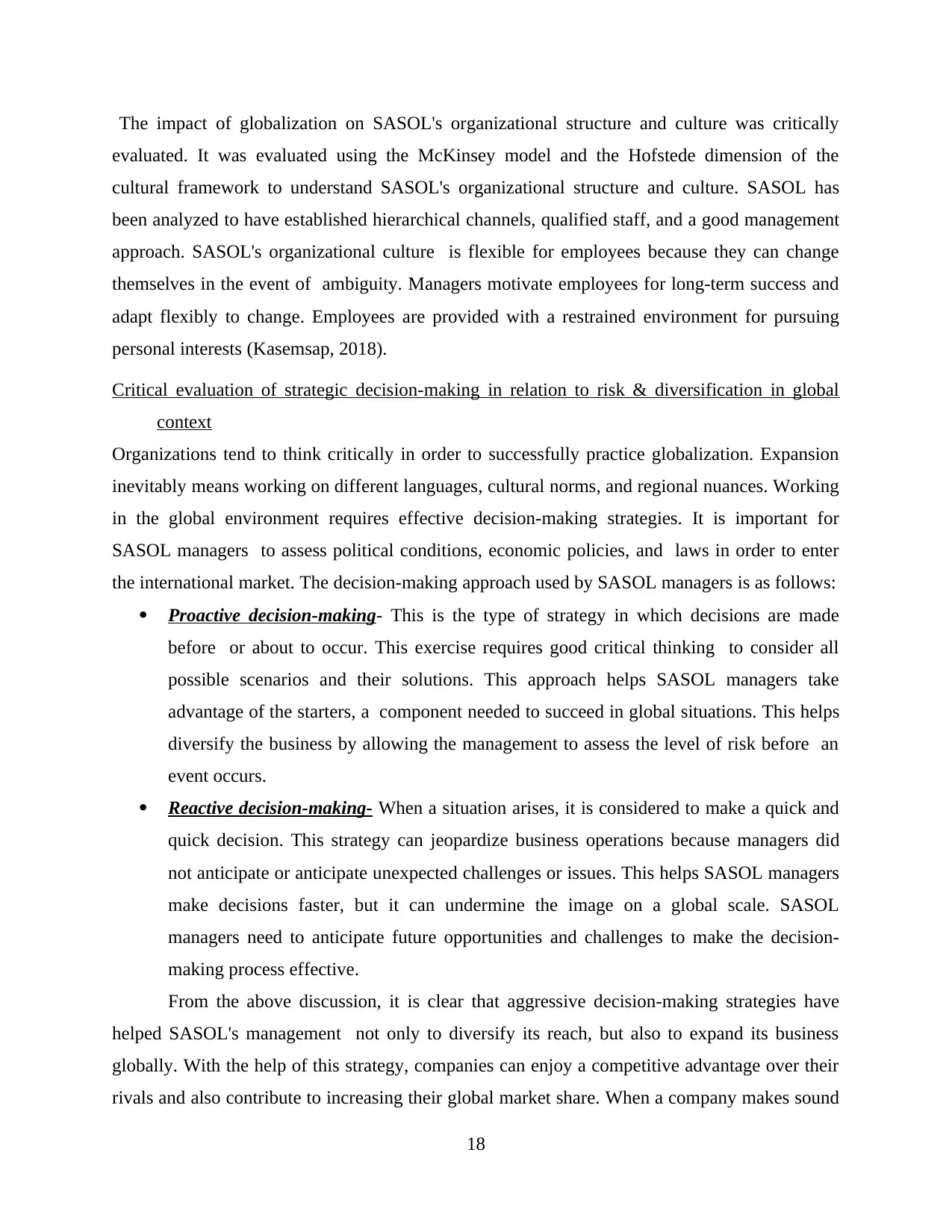
The impact of globalization on SASOL's organizational structure and culture was critically
evaluated. It was evaluated using the McKinsey model and the Hofstede dimension of the
cultural framework to understand SASOL's organizational structure and culture. SASOL has
been analyzed to have established hierarchical channels, qualified staff, and a good management
approach. SASOL's organizational culture is flexible for employees because they can change
themselves in the event of ambiguity. Managers motivate employees for long-term success and
adapt flexibly to change. Employees are provided with a restrained environment for pursuing
personal interests (Kasemsap, 2018).
Critical evaluation of strategic decision-making in relation to risk & diversification in global
context
Organizations tend to think critically in order to successfully practice globalization. Expansion
inevitably means working on different languages, cultural norms, and regional nuances. Working
in the global environment requires effective decision-making strategies. It is important for
SASOL managers to assess political conditions, economic policies, and laws in order to enter
the international market. The decision-making approach used by SASOL managers is as follows:
Proactive decision-making- This is the type of strategy in which decisions are made
before or about to occur. This exercise requires good critical thinking to consider all
possible scenarios and their solutions. This approach helps SASOL managers take
advantage of the starters, a component needed to succeed in global situations. This helps
diversify the business by allowing the management to assess the level of risk before an
event occurs.
Reactive decision-making- When a situation arises, it is considered to make a quick and
quick decision. This strategy can jeopardize business operations because managers did
not anticipate or anticipate unexpected challenges or issues. This helps SASOL managers
make decisions faster, but it can undermine the image on a global scale. SASOL
managers need to anticipate future opportunities and challenges to make the decision-
making process effective.
From the above discussion, it is clear that aggressive decision-making strategies have
helped SASOL's management not only to diversify its reach, but also to expand its business
globally. With the help of this strategy, companies can enjoy a competitive advantage over their
rivals and also contribute to increasing their global market share. When a company makes sound
18
evaluated. It was evaluated using the McKinsey model and the Hofstede dimension of the
cultural framework to understand SASOL's organizational structure and culture. SASOL has
been analyzed to have established hierarchical channels, qualified staff, and a good management
approach. SASOL's organizational culture is flexible for employees because they can change
themselves in the event of ambiguity. Managers motivate employees for long-term success and
adapt flexibly to change. Employees are provided with a restrained environment for pursuing
personal interests (Kasemsap, 2018).
Critical evaluation of strategic decision-making in relation to risk & diversification in global
context
Organizations tend to think critically in order to successfully practice globalization. Expansion
inevitably means working on different languages, cultural norms, and regional nuances. Working
in the global environment requires effective decision-making strategies. It is important for
SASOL managers to assess political conditions, economic policies, and laws in order to enter
the international market. The decision-making approach used by SASOL managers is as follows:
Proactive decision-making- This is the type of strategy in which decisions are made
before or about to occur. This exercise requires good critical thinking to consider all
possible scenarios and their solutions. This approach helps SASOL managers take
advantage of the starters, a component needed to succeed in global situations. This helps
diversify the business by allowing the management to assess the level of risk before an
event occurs.
Reactive decision-making- When a situation arises, it is considered to make a quick and
quick decision. This strategy can jeopardize business operations because managers did
not anticipate or anticipate unexpected challenges or issues. This helps SASOL managers
make decisions faster, but it can undermine the image on a global scale. SASOL
managers need to anticipate future opportunities and challenges to make the decision-
making process effective.
From the above discussion, it is clear that aggressive decision-making strategies have
helped SASOL's management not only to diversify its reach, but also to expand its business
globally. With the help of this strategy, companies can enjoy a competitive advantage over their
rivals and also contribute to increasing their global market share. When a company makes sound
18
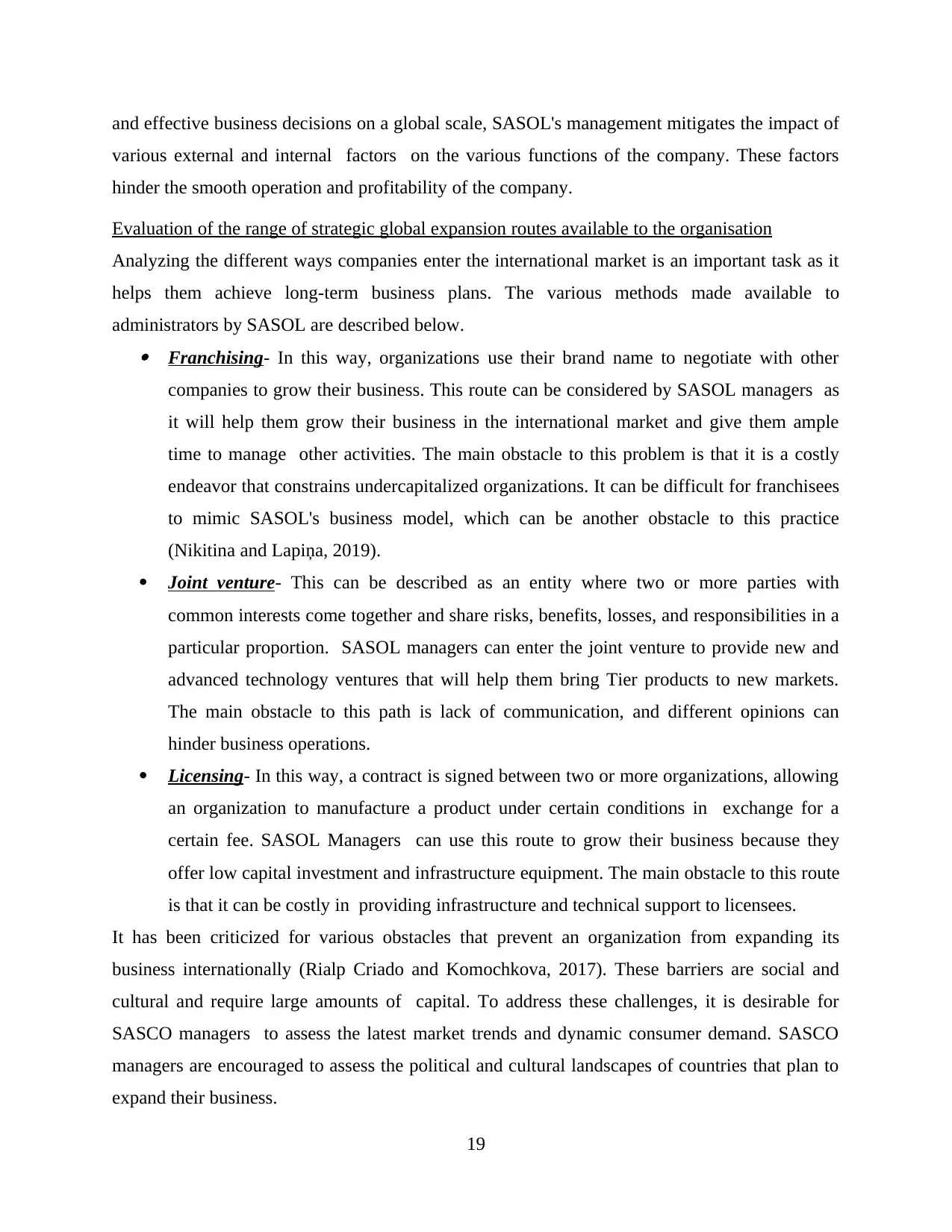
and effective business decisions on a global scale, SASOL's management mitigates the impact of
various external and internal factors on the various functions of the company. These factors
hinder the smooth operation and profitability of the company.
Evaluation of the range of strategic global expansion routes available to the organisation
Analyzing the different ways companies enter the international market is an important task as it
helps them achieve long-term business plans. The various methods made available to
administrators by SASOL are described below. Franchising- In this way, organizations use their brand name to negotiate with other
companies to grow their business. This route can be considered by SASOL managers as
it will help them grow their business in the international market and give them ample
time to manage other activities. The main obstacle to this problem is that it is a costly
endeavor that constrains undercapitalized organizations. It can be difficult for franchisees
to mimic SASOL's business model, which can be another obstacle to this practice
(Nikitina and Lapiņa, 2019).
Joint venture- This can be described as an entity where two or more parties with
common interests come together and share risks, benefits, losses, and responsibilities in a
particular proportion. SASOL managers can enter the joint venture to provide new and
advanced technology ventures that will help them bring Tier products to new markets.
The main obstacle to this path is lack of communication, and different opinions can
hinder business operations.
Licensing- In this way, a contract is signed between two or more organizations, allowing
an organization to manufacture a product under certain conditions in exchange for a
certain fee. SASOL Managers can use this route to grow their business because they
offer low capital investment and infrastructure equipment. The main obstacle to this route
is that it can be costly in providing infrastructure and technical support to licensees.
It has been criticized for various obstacles that prevent an organization from expanding its
business internationally (Rialp Criado and Komochkova, 2017). These barriers are social and
cultural and require large amounts of capital. To address these challenges, it is desirable for
SASCO managers to assess the latest market trends and dynamic consumer demand. SASCO
managers are encouraged to assess the political and cultural landscapes of countries that plan to
expand their business.
19
various external and internal factors on the various functions of the company. These factors
hinder the smooth operation and profitability of the company.
Evaluation of the range of strategic global expansion routes available to the organisation
Analyzing the different ways companies enter the international market is an important task as it
helps them achieve long-term business plans. The various methods made available to
administrators by SASOL are described below. Franchising- In this way, organizations use their brand name to negotiate with other
companies to grow their business. This route can be considered by SASOL managers as
it will help them grow their business in the international market and give them ample
time to manage other activities. The main obstacle to this problem is that it is a costly
endeavor that constrains undercapitalized organizations. It can be difficult for franchisees
to mimic SASOL's business model, which can be another obstacle to this practice
(Nikitina and Lapiņa, 2019).
Joint venture- This can be described as an entity where two or more parties with
common interests come together and share risks, benefits, losses, and responsibilities in a
particular proportion. SASOL managers can enter the joint venture to provide new and
advanced technology ventures that will help them bring Tier products to new markets.
The main obstacle to this path is lack of communication, and different opinions can
hinder business operations.
Licensing- In this way, a contract is signed between two or more organizations, allowing
an organization to manufacture a product under certain conditions in exchange for a
certain fee. SASOL Managers can use this route to grow their business because they
offer low capital investment and infrastructure equipment. The main obstacle to this route
is that it can be costly in providing infrastructure and technical support to licensees.
It has been criticized for various obstacles that prevent an organization from expanding its
business internationally (Rialp Criado and Komochkova, 2017). These barriers are social and
cultural and require large amounts of capital. To address these challenges, it is desirable for
SASCO managers to assess the latest market trends and dynamic consumer demand. SASCO
managers are encouraged to assess the political and cultural landscapes of countries that plan to
expand their business.
19
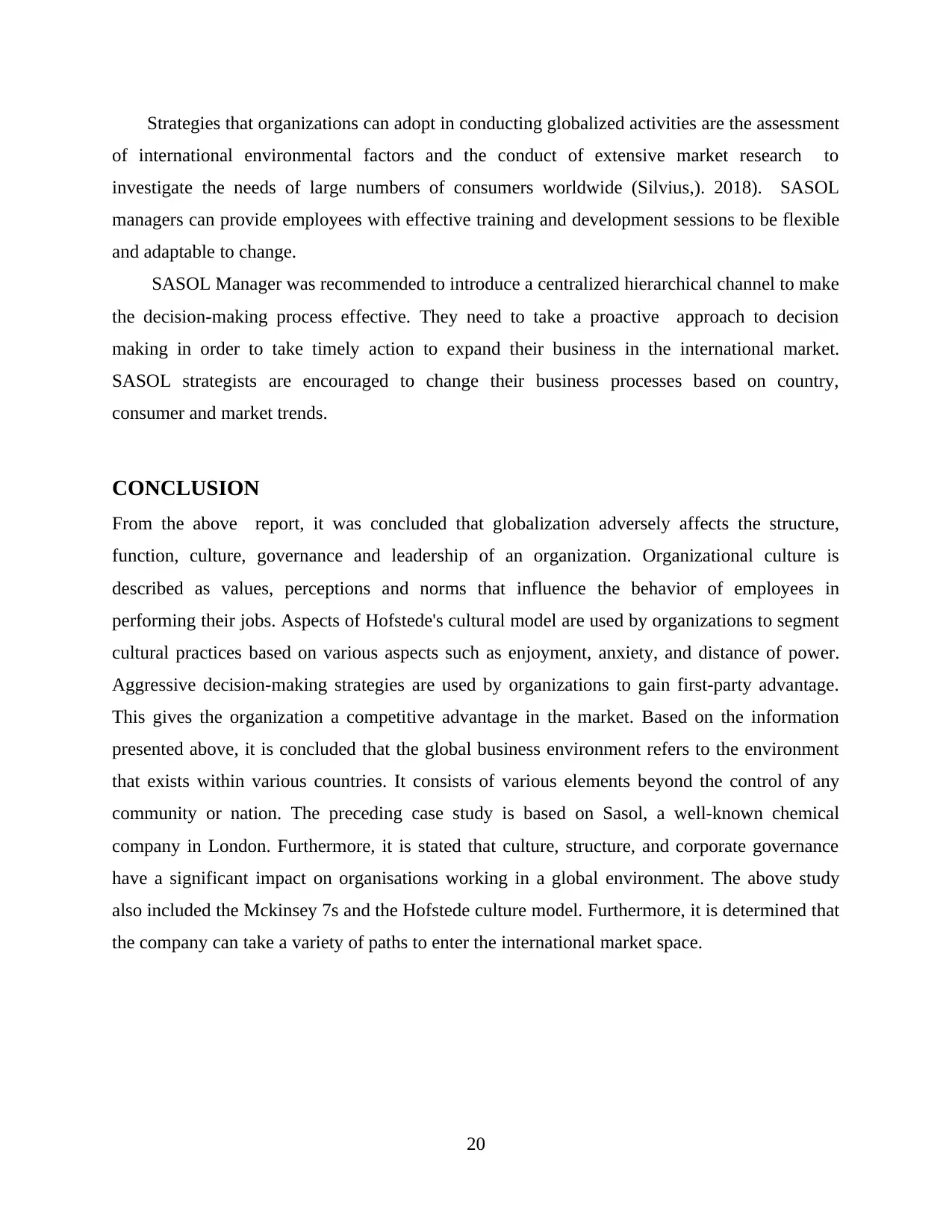
Strategies that organizations can adopt in conducting globalized activities are the assessment
of international environmental factors and the conduct of extensive market research to
investigate the needs of large numbers of consumers worldwide (Silvius,). 2018). SASOL
managers can provide employees with effective training and development sessions to be flexible
and adaptable to change.
SASOL Manager was recommended to introduce a centralized hierarchical channel to make
the decision-making process effective. They need to take a proactive approach to decision
making in order to take timely action to expand their business in the international market.
SASOL strategists are encouraged to change their business processes based on country,
consumer and market trends.
CONCLUSION
From the above report, it was concluded that globalization adversely affects the structure,
function, culture, governance and leadership of an organization. Organizational culture is
described as values, perceptions and norms that influence the behavior of employees in
performing their jobs. Aspects of Hofstede's cultural model are used by organizations to segment
cultural practices based on various aspects such as enjoyment, anxiety, and distance of power.
Aggressive decision-making strategies are used by organizations to gain first-party advantage.
This gives the organization a competitive advantage in the market. Based on the information
presented above, it is concluded that the global business environment refers to the environment
that exists within various countries. It consists of various elements beyond the control of any
community or nation. The preceding case study is based on Sasol, a well-known chemical
company in London. Furthermore, it is stated that culture, structure, and corporate governance
have a significant impact on organisations working in a global environment. The above study
also included the Mckinsey 7s and the Hofstede culture model. Furthermore, it is determined that
the company can take a variety of paths to enter the international market space.
20
of international environmental factors and the conduct of extensive market research to
investigate the needs of large numbers of consumers worldwide (Silvius,). 2018). SASOL
managers can provide employees with effective training and development sessions to be flexible
and adaptable to change.
SASOL Manager was recommended to introduce a centralized hierarchical channel to make
the decision-making process effective. They need to take a proactive approach to decision
making in order to take timely action to expand their business in the international market.
SASOL strategists are encouraged to change their business processes based on country,
consumer and market trends.
CONCLUSION
From the above report, it was concluded that globalization adversely affects the structure,
function, culture, governance and leadership of an organization. Organizational culture is
described as values, perceptions and norms that influence the behavior of employees in
performing their jobs. Aspects of Hofstede's cultural model are used by organizations to segment
cultural practices based on various aspects such as enjoyment, anxiety, and distance of power.
Aggressive decision-making strategies are used by organizations to gain first-party advantage.
This gives the organization a competitive advantage in the market. Based on the information
presented above, it is concluded that the global business environment refers to the environment
that exists within various countries. It consists of various elements beyond the control of any
community or nation. The preceding case study is based on Sasol, a well-known chemical
company in London. Furthermore, it is stated that culture, structure, and corporate governance
have a significant impact on organisations working in a global environment. The above study
also included the Mckinsey 7s and the Hofstede culture model. Furthermore, it is determined that
the company can take a variety of paths to enter the international market space.
20
Secure Best Marks with AI Grader
Need help grading? Try our AI Grader for instant feedback on your assignments.
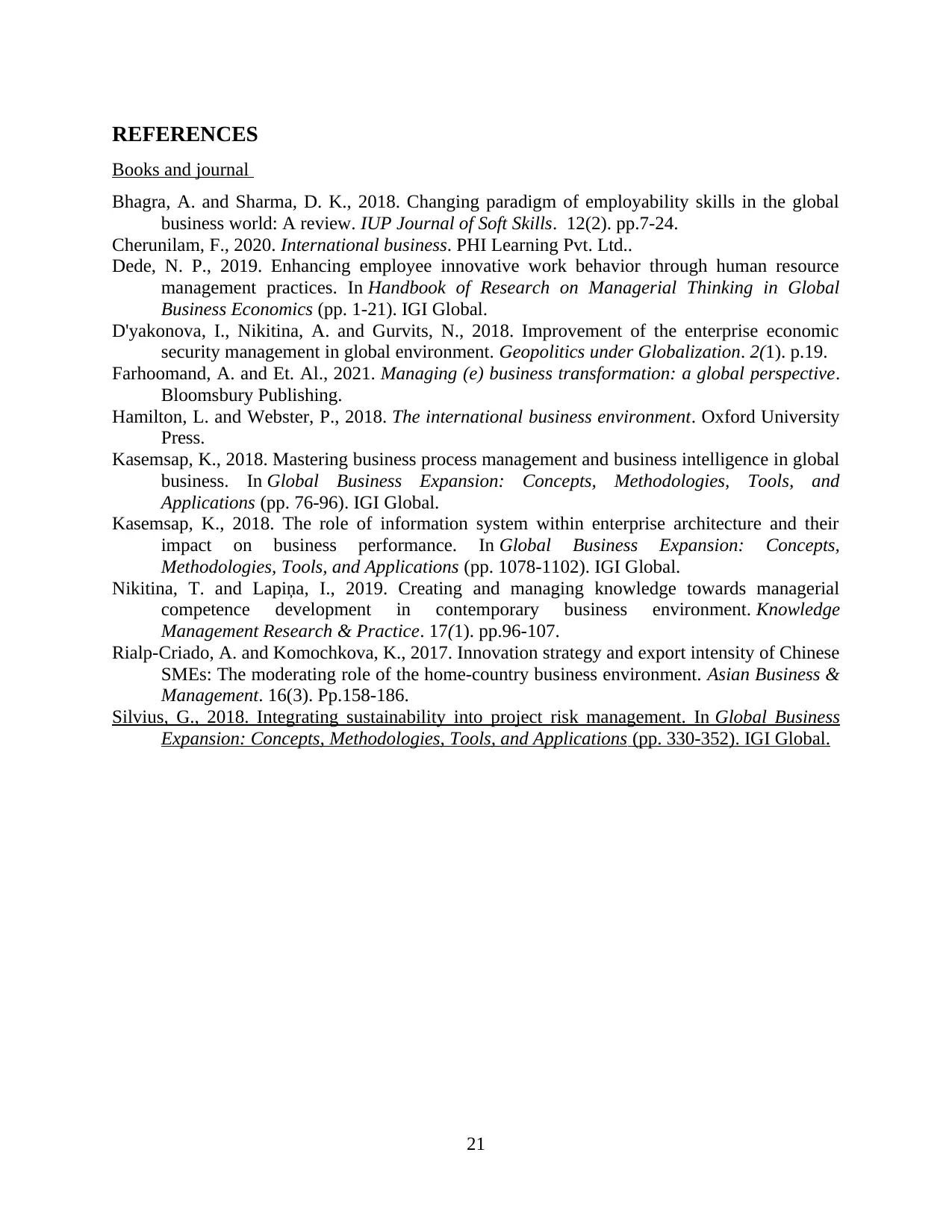
REFERENCES
Books and journal
Bhagra, A. and Sharma, D. K., 2018. Changing paradigm of employability skills in the global
business world: A review. IUP Journal of Soft Skills. 12(2). pp.7-24.
Cherunilam, F., 2020. International business. PHI Learning Pvt. Ltd..
Dede, N. P., 2019. Enhancing employee innovative work behavior through human resource
management practices. In Handbook of Research on Managerial Thinking in Global
Business Economics (pp. 1-21). IGI Global.
D'yakonova, I., Nikitina, A. and Gurvits, N., 2018. Improvement of the enterprise economic
security management in global environment. Geopolitics under Globalization. 2(1). p.19.
Farhoomand, A. and Et. Al., 2021. Managing (e) business transformation: a global perspective.
Bloomsbury Publishing.
Hamilton, L. and Webster, P., 2018. The international business environment. Oxford University
Press.
Kasemsap, K., 2018. Mastering business process management and business intelligence in global
business. In Global Business Expansion: Concepts, Methodologies, Tools, and
Applications (pp. 76-96). IGI Global.
Kasemsap, K., 2018. The role of information system within enterprise architecture and their
impact on business performance. In Global Business Expansion: Concepts,
Methodologies, Tools, and Applications (pp. 1078-1102). IGI Global.
Nikitina, T. and Lapiņa, I., 2019. Creating and managing knowledge towards managerial
competence development in contemporary business environment. Knowledge
Management Research & Practice. 17(1). pp.96-107.
Rialp-Criado, A. and Komochkova, K., 2017. Innovation strategy and export intensity of Chinese
SMEs: The moderating role of the home-country business environment. Asian Business &
Management. 16(3). Pp.158-186.
Silvius, G., 2018. Integrating sustainability into project risk management. In Global Business
Expansion: Concepts, Methodologies, Tools, and Applications (pp. 330-352). IGI Global.
21
Books and journal
Bhagra, A. and Sharma, D. K., 2018. Changing paradigm of employability skills in the global
business world: A review. IUP Journal of Soft Skills. 12(2). pp.7-24.
Cherunilam, F., 2020. International business. PHI Learning Pvt. Ltd..
Dede, N. P., 2019. Enhancing employee innovative work behavior through human resource
management practices. In Handbook of Research on Managerial Thinking in Global
Business Economics (pp. 1-21). IGI Global.
D'yakonova, I., Nikitina, A. and Gurvits, N., 2018. Improvement of the enterprise economic
security management in global environment. Geopolitics under Globalization. 2(1). p.19.
Farhoomand, A. and Et. Al., 2021. Managing (e) business transformation: a global perspective.
Bloomsbury Publishing.
Hamilton, L. and Webster, P., 2018. The international business environment. Oxford University
Press.
Kasemsap, K., 2018. Mastering business process management and business intelligence in global
business. In Global Business Expansion: Concepts, Methodologies, Tools, and
Applications (pp. 76-96). IGI Global.
Kasemsap, K., 2018. The role of information system within enterprise architecture and their
impact on business performance. In Global Business Expansion: Concepts,
Methodologies, Tools, and Applications (pp. 1078-1102). IGI Global.
Nikitina, T. and Lapiņa, I., 2019. Creating and managing knowledge towards managerial
competence development in contemporary business environment. Knowledge
Management Research & Practice. 17(1). pp.96-107.
Rialp-Criado, A. and Komochkova, K., 2017. Innovation strategy and export intensity of Chinese
SMEs: The moderating role of the home-country business environment. Asian Business &
Management. 16(3). Pp.158-186.
Silvius, G., 2018. Integrating sustainability into project risk management. In Global Business
Expansion: Concepts, Methodologies, Tools, and Applications (pp. 330-352). IGI Global.
21
1 out of 23
Related Documents
Your All-in-One AI-Powered Toolkit for Academic Success.
+13062052269
info@desklib.com
Available 24*7 on WhatsApp / Email
![[object Object]](/_next/static/media/star-bottom.7253800d.svg)
Unlock your academic potential
© 2024 | Zucol Services PVT LTD | All rights reserved.
